Fr. Thomas Leitner was the celebrant for the Feast of The Epiphany this morning. Listen to his homily and learn about the gift of a piece of straw!
Epiphany-Marking the Door and Blessing the House
At Christ the King Priory we have the custom to bless our monastery on the Solemnity of the Epiphany of the Lord. After Mass, the presider writes the characters C + M + B on the frame of the entrance door, which represent, “Christ may bless this house,” and also the numbers of the New Year 20 18 to the left and to the right of the characters. Then he walks through the building, sprinkling it with holy water and incensing it. In the end he speaks a blessing over the house. The holy water reminds us of our baptism. In baptism we were born to new life with Christ. From our baptism on we belong to Christ. During this ritual we pray that as the fragrance of the incense fills the rooms the Holy Spirit may fill this house with its aroma and that all the spirits which are not the Holy Spirit may be banned from it.
by Fr. Thomas Leitner
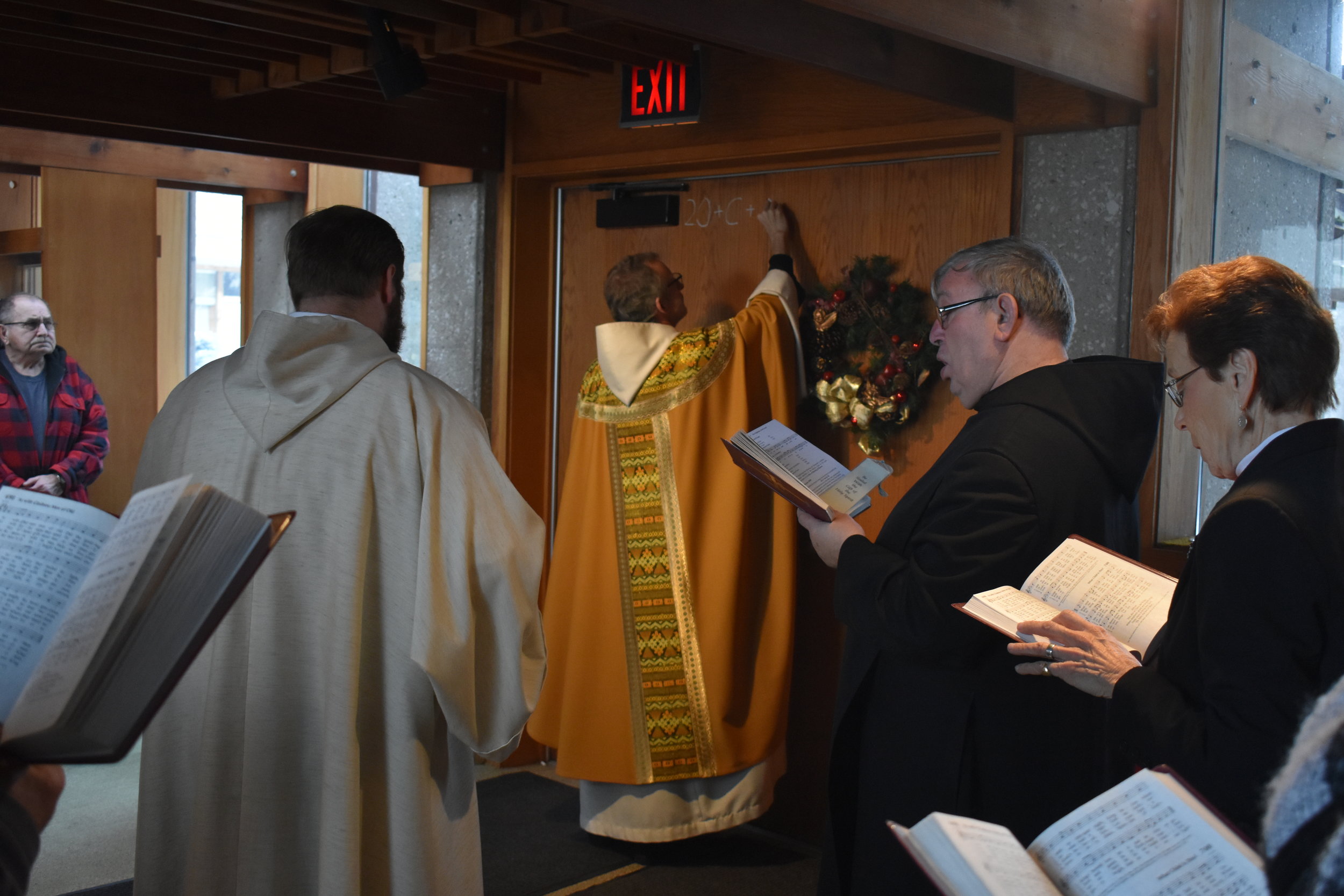
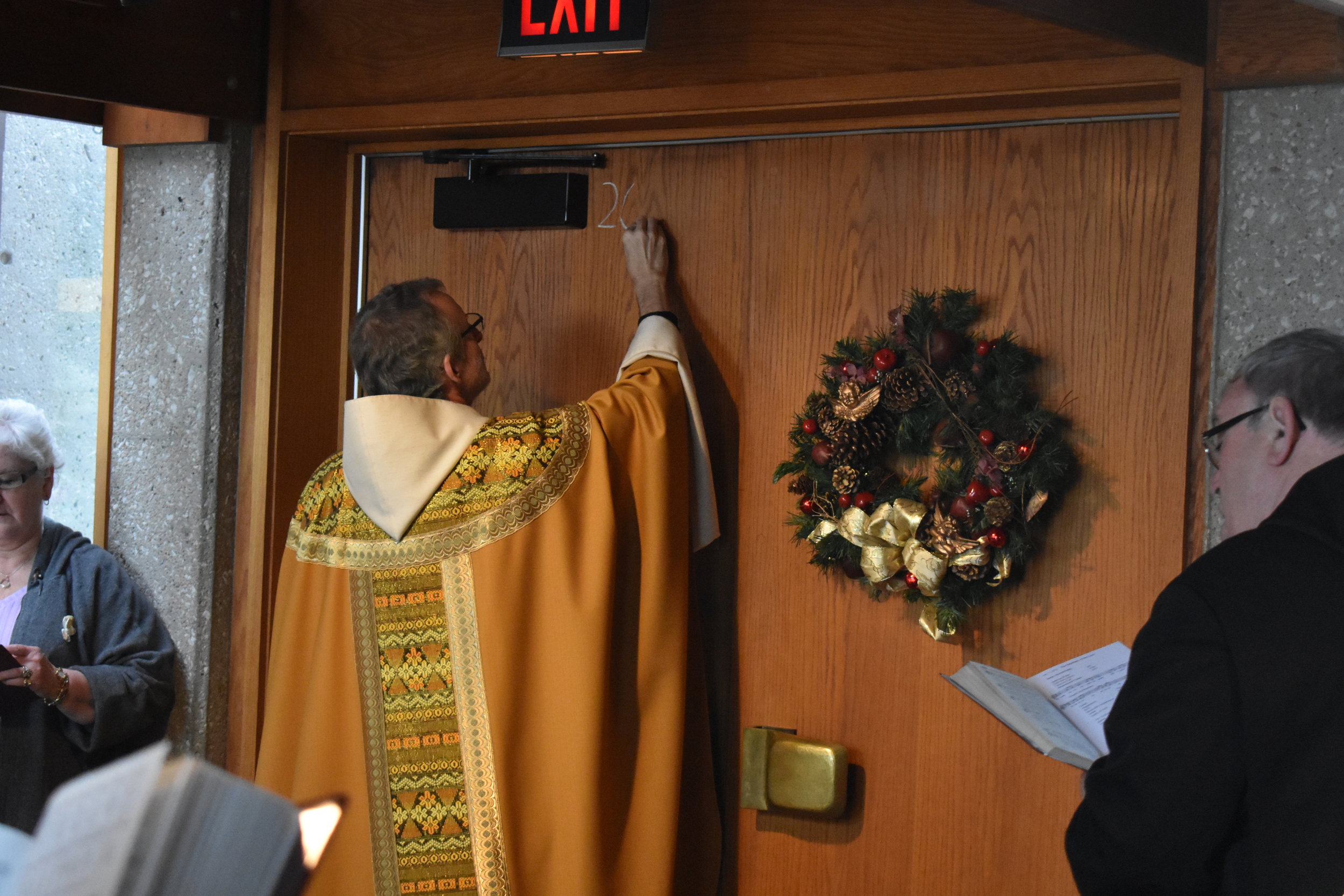
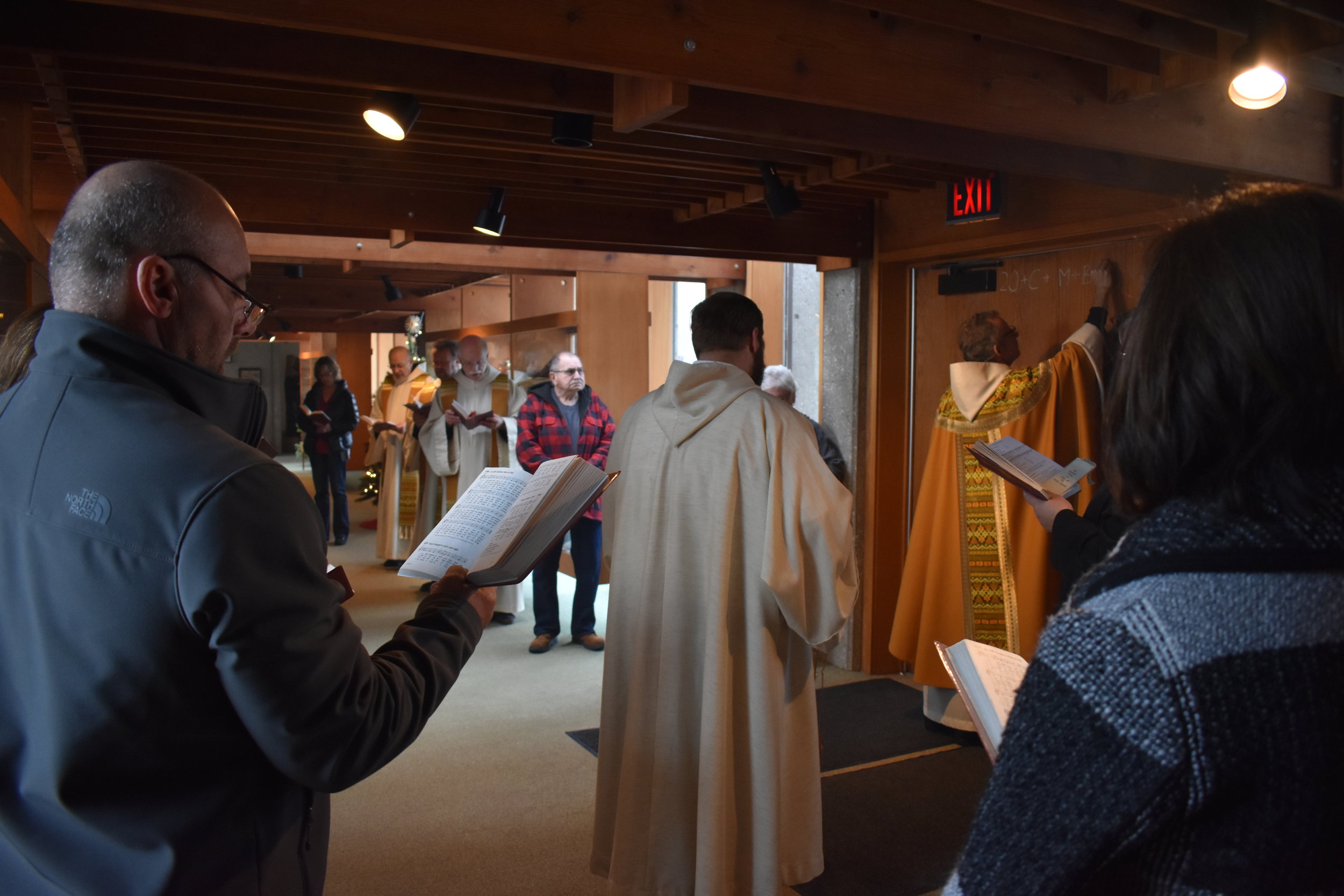
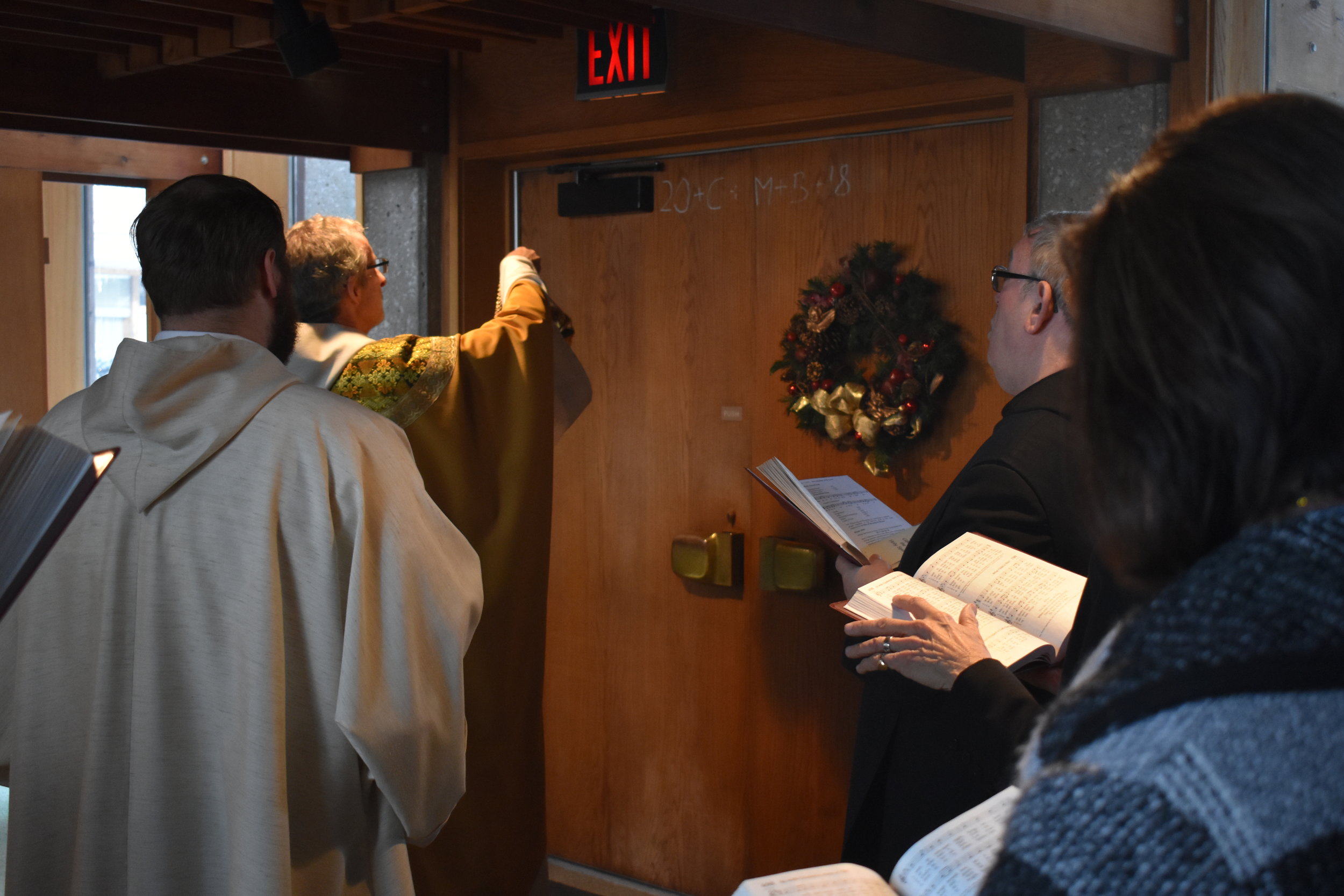
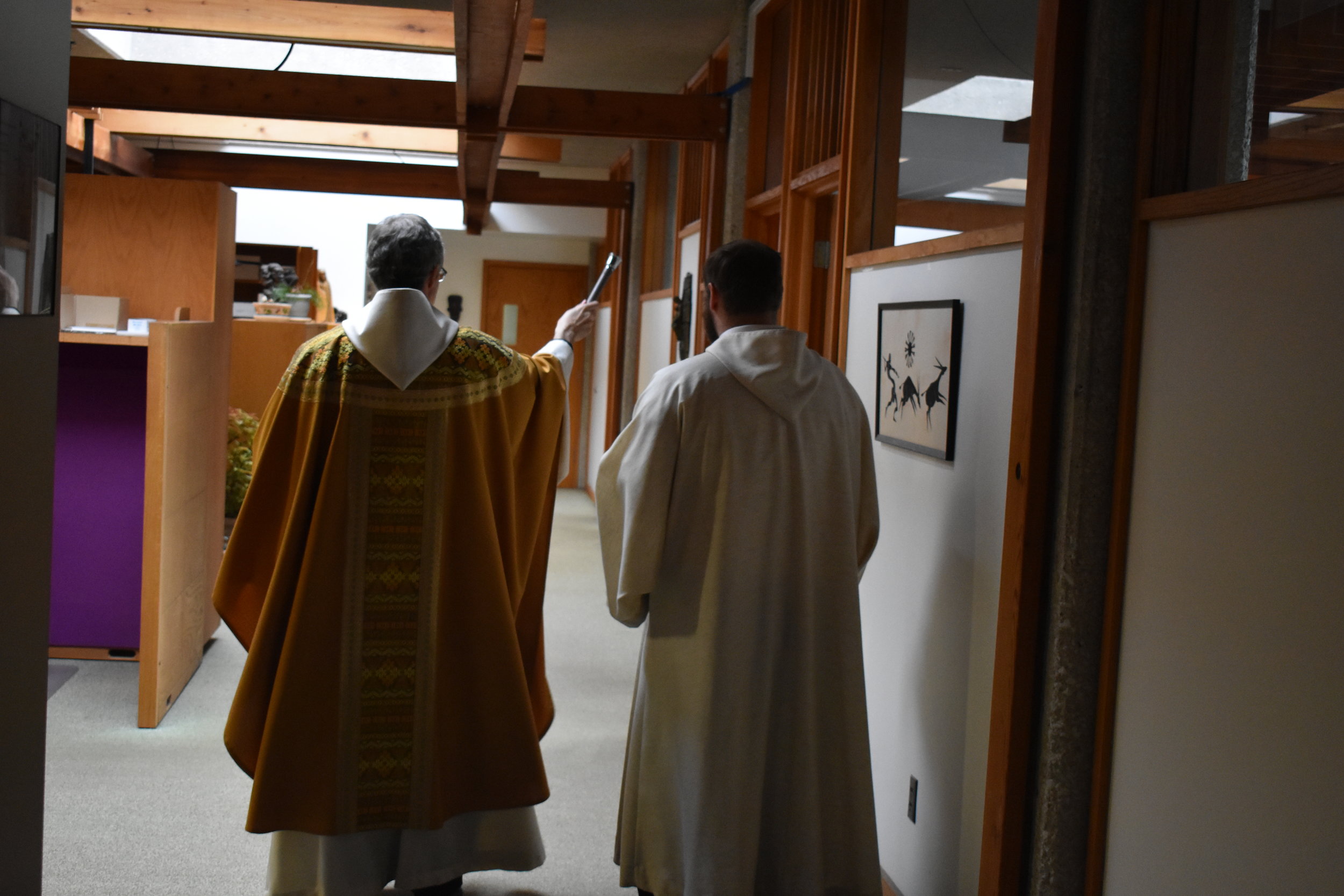
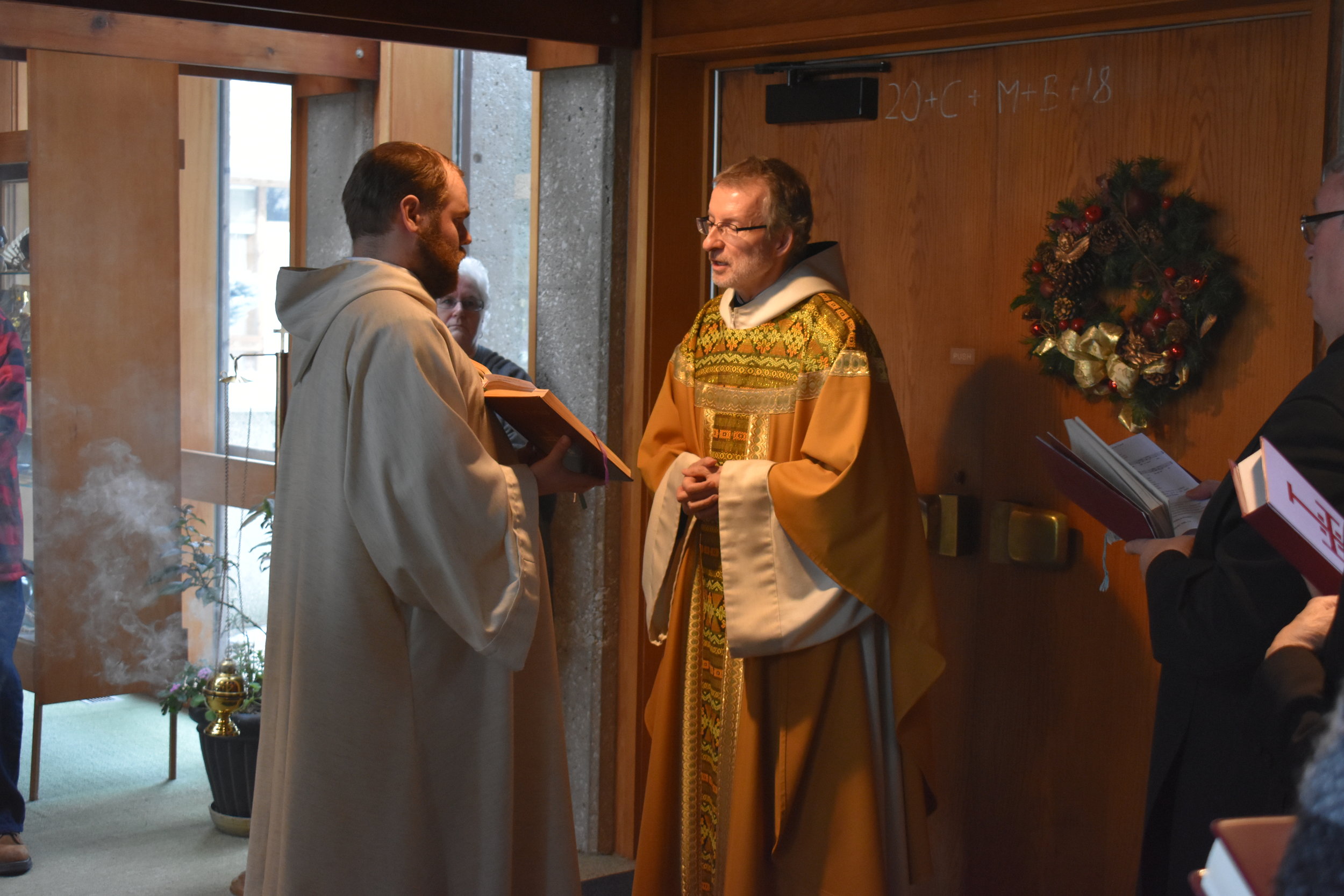
The Nativity Scene In The Chapel
The history of the Christmas crib at Christ the King monastery
This crib all started when I asked my family, the Hillenbrands from Evansville, IN to donate a nice set of Fontanini statues from Italy to my former monastery in South Dakota, Blue Cloud Abbey. This was around the turn of the century, early 2000. I brought this set with me when I transferred by stability to Christ the King monastery in 2013.
The statues all vary in heights, the tallest ones being about 18” high, and the shorter ones about 8 or 10 inches. They are made out of a type of resin and are pretty much unbreakable.
I built the crib set in our carpenter shop at Blue Cloud Abbey. The rough, old, and worn wood adds a certain warmth and ruggedness to the crib. The posts came from an old farm house porch they we tore down. The rest of the wood came from an old fence we had around the feed lot for our cattle.
For the kings I made a winding, rocky road, about 6 ft. long and put the kings at the far end of this road. As we get closer to the Feast of the 3 Kings, Epiphany, around Jan. 6th, I move the Kings a little closer to the stable and manger during the days leading up to Epiphany.
There is an angel hanging from the ceiling on a nearly invisible fish line with a spot light on it.
Fr. Thomas Hillenbrand, OSB
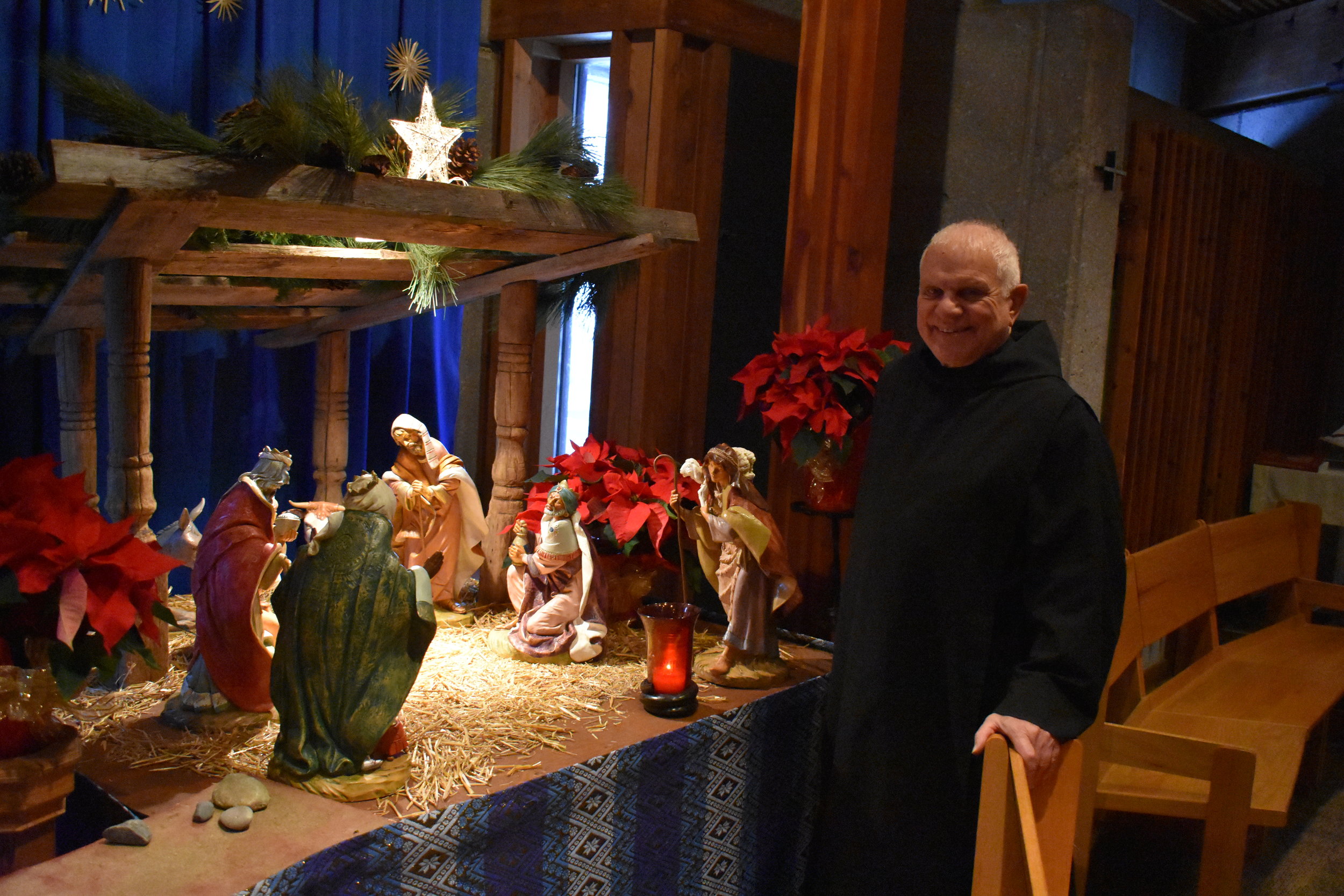
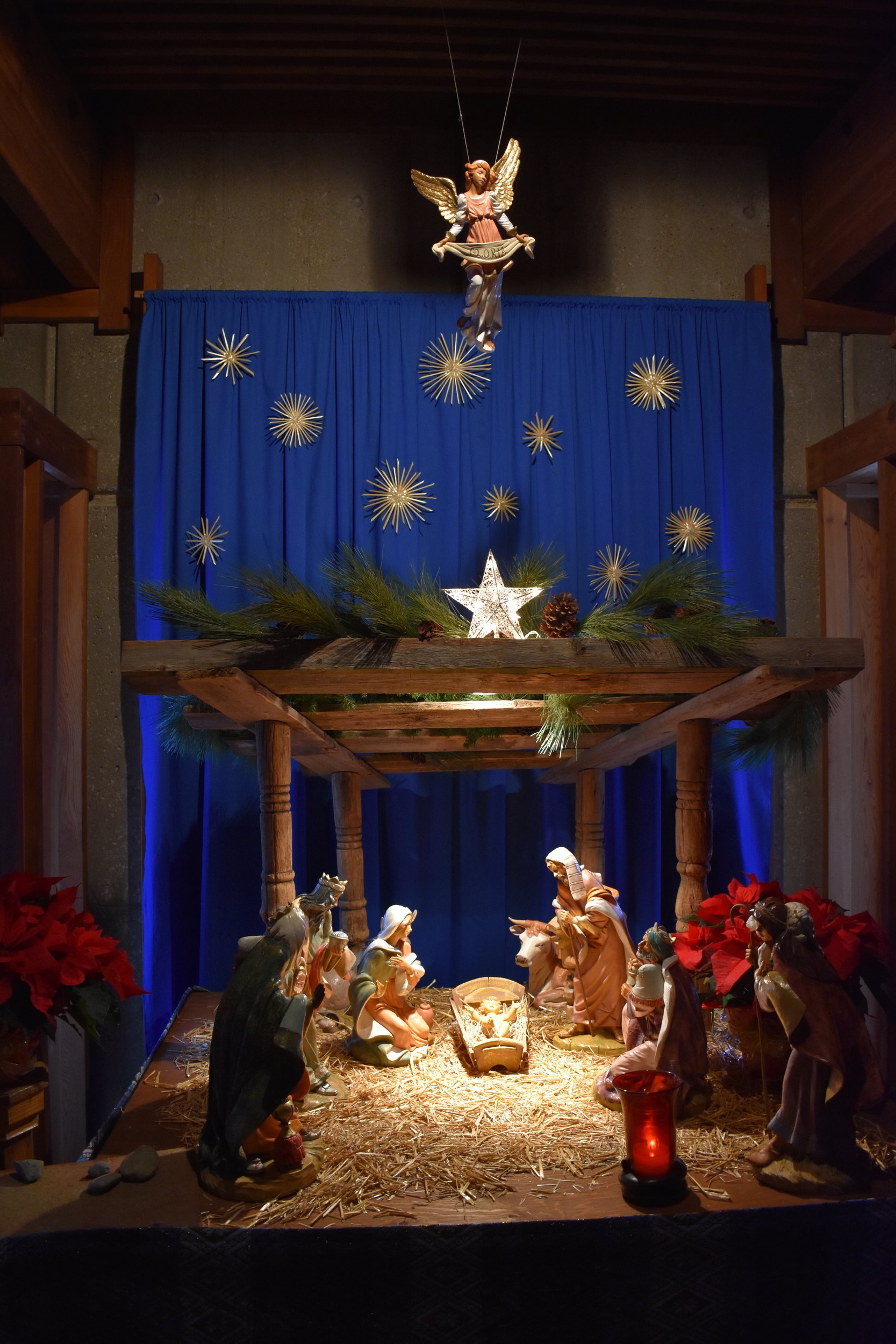
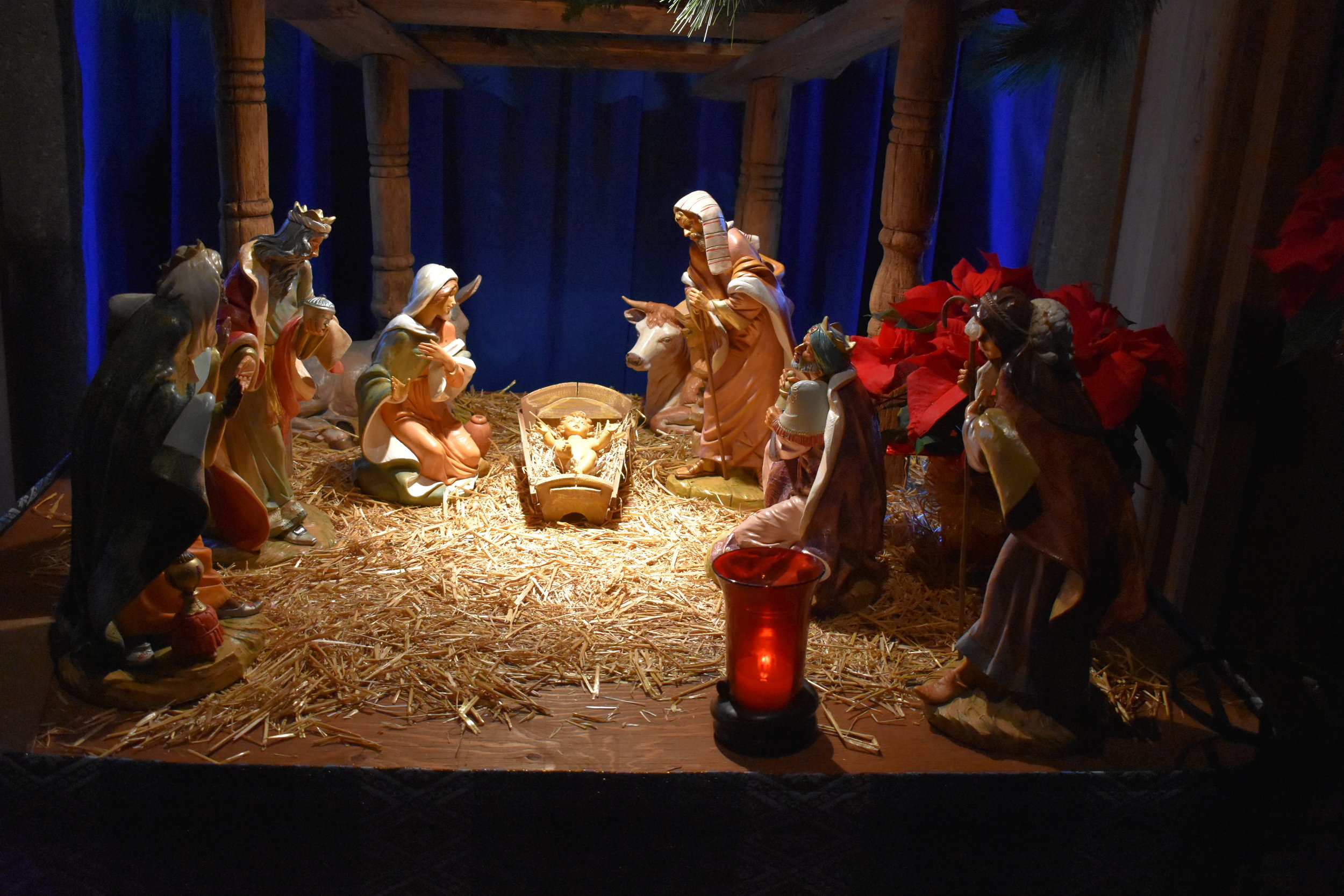
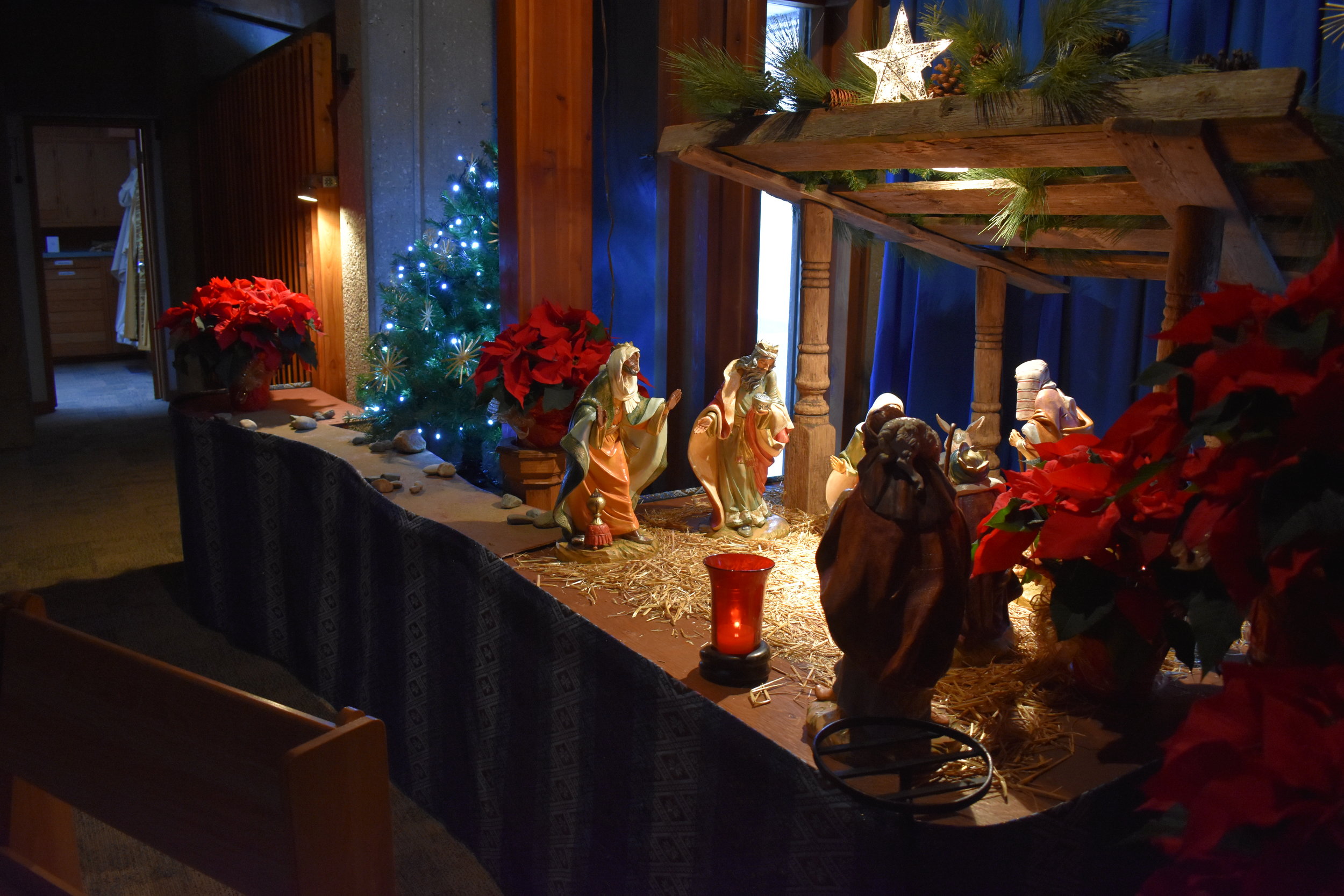

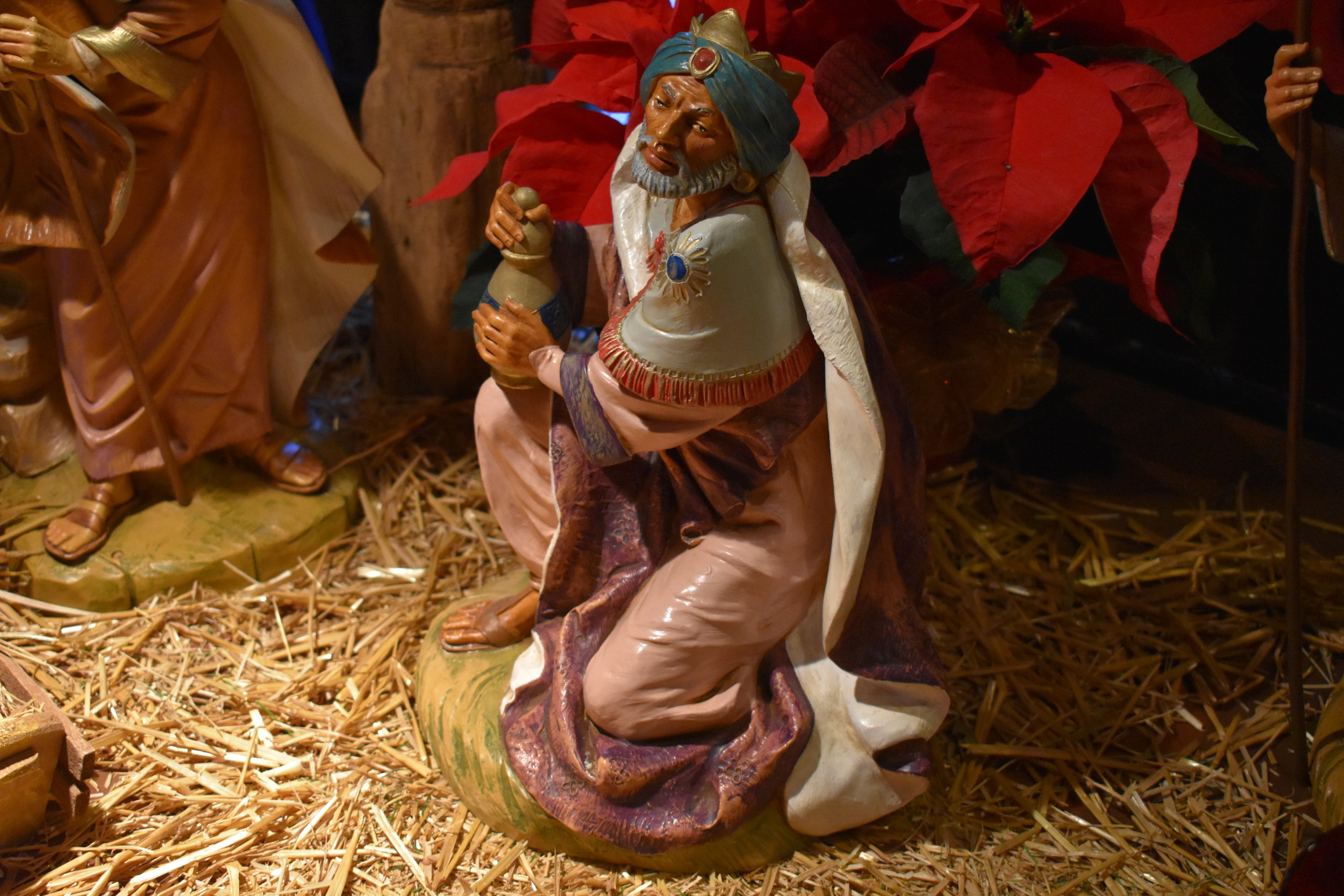
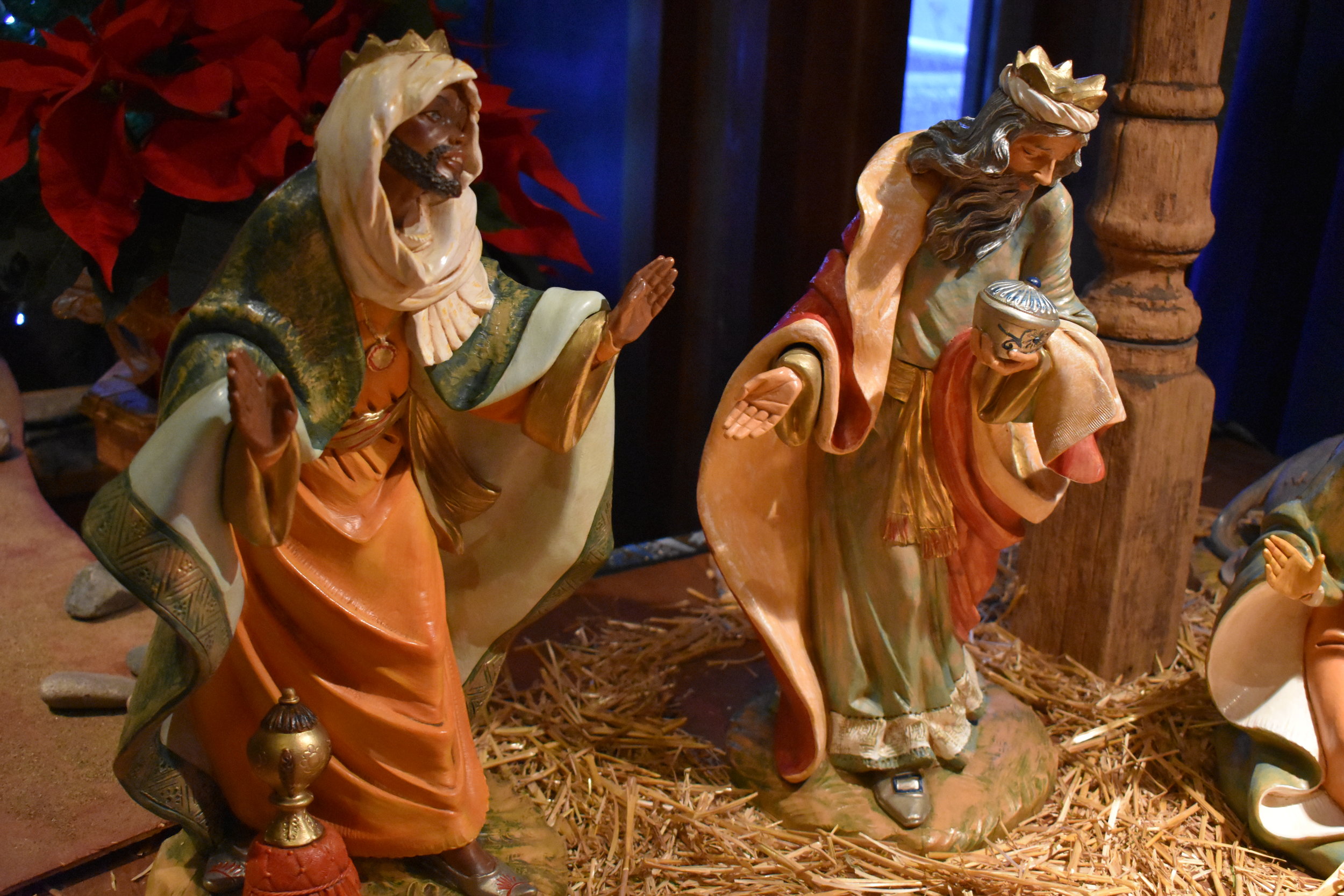
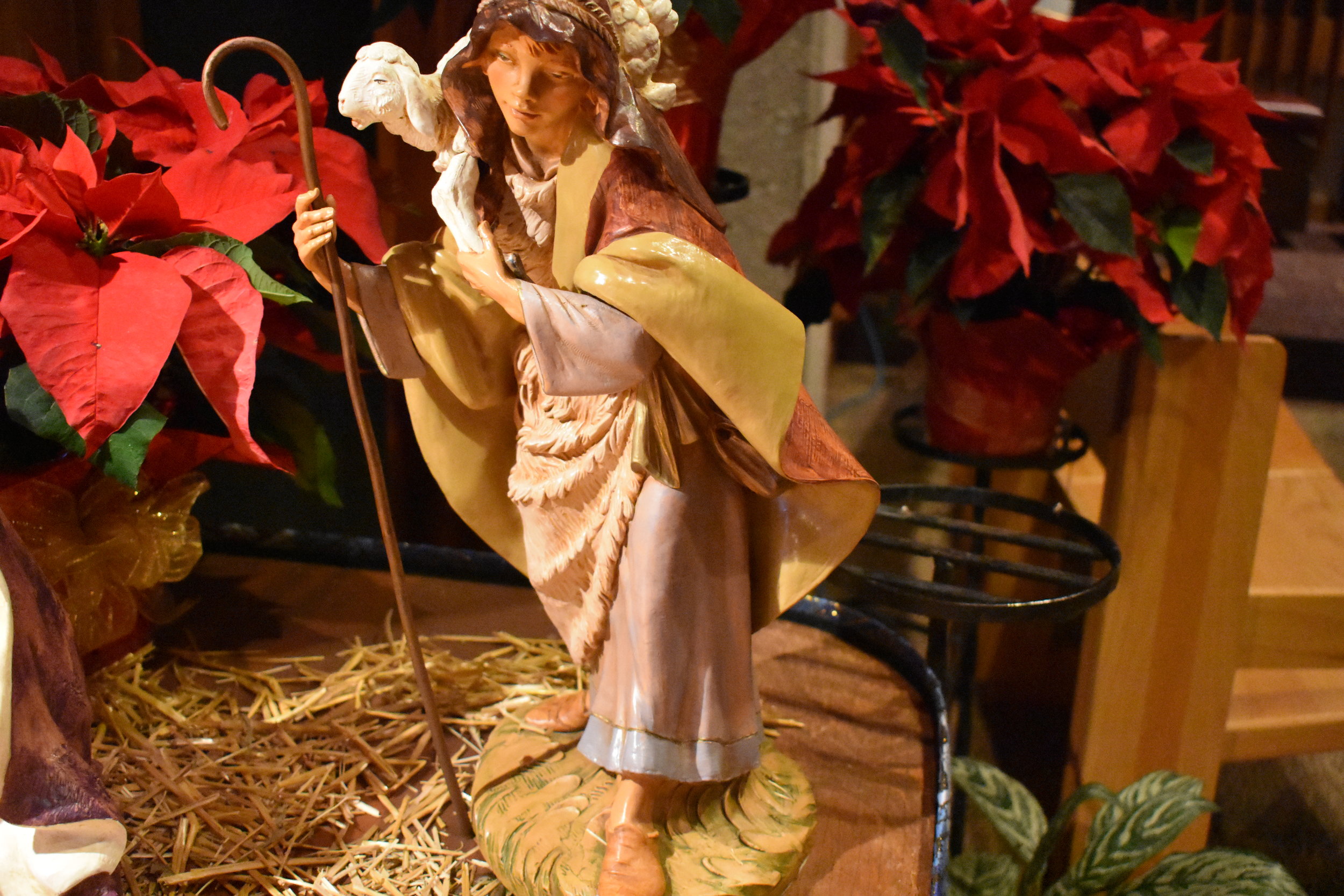
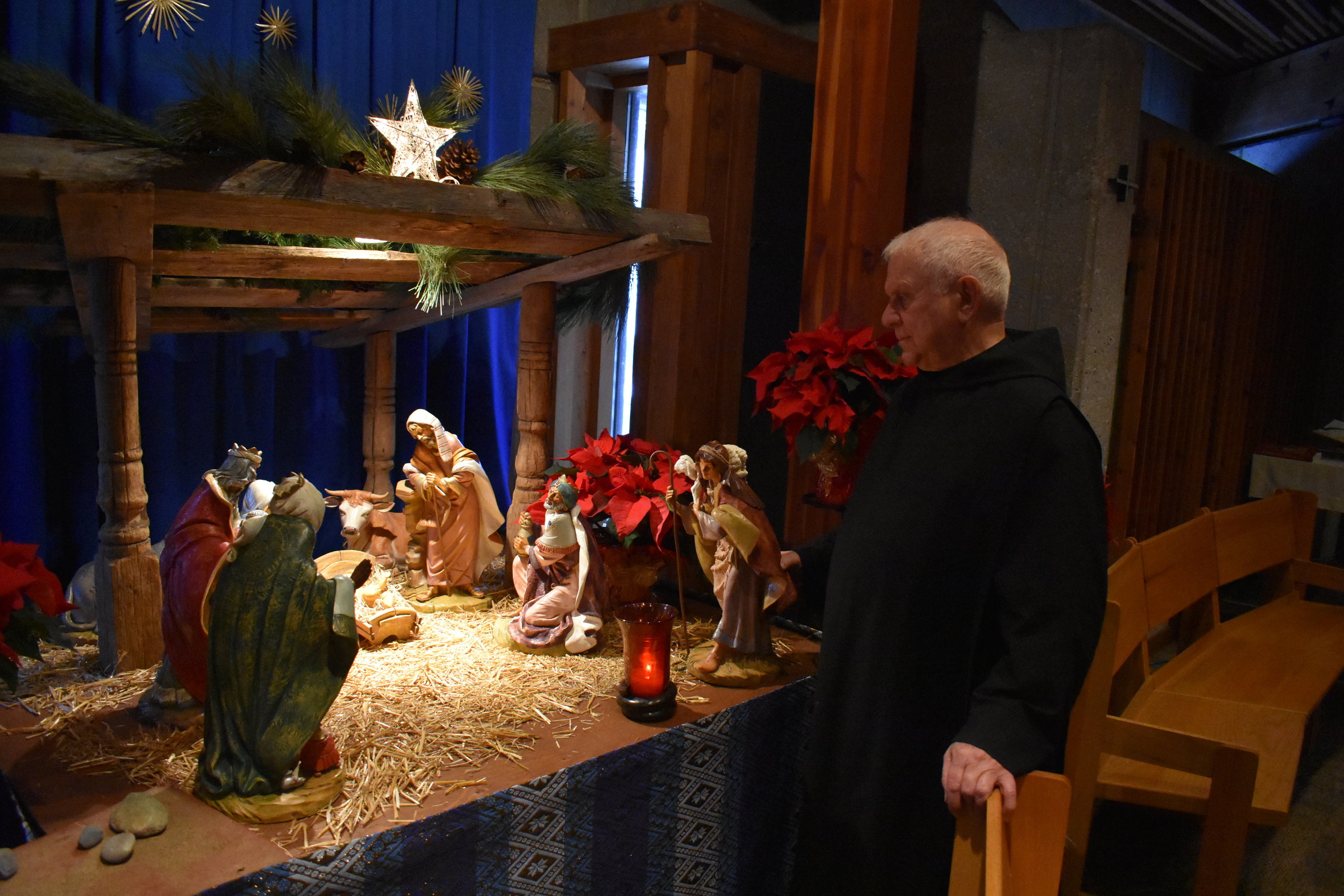
Homily - Christmas Vigil and Midnight Mass
Our Prior, Fr. Joel Macul celebrated the Holy Mass and give the homily for the Christmas Vigil and Midnight Mass at the St. Benedict Center. Below is a copy of his words.
Isaiah 9:1–6
Titus 2:11–14
Luke 2:1–14
Midnight! There is something attractive about that hour. Midnight seems to fascinate. Why? It is though we must have the light shine in the midst of the darkness. It must be that we have to struggle to stay awake. Or we have to get up and greet this light in the middle of the night. God’s word must be heard in the midst of deep silence. The creative power of his light, the new day of his creation, must be greeted just when it seems that darkness will win out.
Perhaps the tradition of midnight Mass is more than just a “Well, this is just the way we always did it.” Perhaps the tradition is grounded in the human hope that God will break into this shield of darkness and we need and want to be there to experience it and to be touched by it again. In the ritual of gathering in the middle of the night, more is happening than just a pleasant memory of family or monastic traditions. What is happening is that we are proclaiming a victory over everything associated with darkness. We are saying that the world is not grounded in the night but in light. And we will break our sleep; keep vigil in the very heart of darkness to greet the coming of light.
There is something of a mystery here. We dare to say that the darkness makes the light shine out all the more. Or the silence makes the sound of the word all the more clear. It is not when things are going OK that light is announced and conquers darkness. God’s light comes when humanity seems lost, covered with a shadow, a pall of hopeless and fear. It is then that God breaks in and starts to work his wonders and reversals.
A family is asked to move just when the wife is heavy with pregnancy. It seems like a poor time to be going anywhere. A wise person would stay put. But no, the mother must give birth in the right place, a place without much human hospitality, a place cold and damp. And the only straw to be found is the straw that animals will eat. What is God doing? What is God saying?
The least he is saying is that he wishes to be seen among the least. He is at least saying that being God has something to do with taking on the human situation at is worst. God is saying that the peace he brings must begin with those who know no justice, who have no real hope. What God is doing is becoming Emmanuel in the least likely place: in the cover of darkness, in a family that is being forced to move; and God finds a bed in a feeding trough.
Christmas appears to be about God taking humanity for what it is: displaced, powerless, without shelter, wandering in the dark; hungry and fearful. All this describes our situation today as much as it does that of Jesus’ time. We do live in a world where some like to generate fear of others, of those who are different. We find ourselves more suspicious, judgmental and critical of others. And we also find ourselves in a world where more people are displaced and uprooted than ever before; where the number of victims of disease rises rather than slackens despite advances of modern medicine; where exploitation of natural resources continues to render people powerless over their own lives. We still live in a world that is governed by power and super powers. We do live in a world where greed, racism and lust seem more normative than exceptional.
All this makes our gathering at midnight in the year 2017 more urgent. We are assembled to hear again a birth story that has much more to it than a baby born 2,000 years ago. The child whose birth we celebrate is not limited to being a baby from long ago. We are here because this child has brought with him a new way of living. It is not that he is born in the middle of the night that is important. But it is that we have seen the light and glory that he brings with him. We are attracted to midnight because there is a glow around it and we want to be in that glow. We are attracted to the midnight child because he changes everything around him. Sure there is still darkness, corruption and abuse and oppression. But there is vision of something different, vastly different and it cannot even compare. There is the vision of something good and beautiful. There is a glimpse of the truth and a word spoken without deceit and a promise made that is kept.
It is not just Jesus that is born. It is a whole new order, a new Kingdom, a new way of relating that is coming to birth. Peace is not just a word about an ideal, but something that God is bringing about. Jesus will be about connecting all that is disconnected and discarded. Jesus will be the peace between all human beings. What is being remembered tonight is that the child that is born for us brings with him all that humanity is about in its deepest desires and longings.
At our midnight gathering, we are blessed to connect with the Child and his kingdom no matter where our life’s journey has taken us. But in coming here to connect with the Child born for us, we are really connecting with our humanity at its best. Humanity as God truly offers it to us. And when we connect with our deepest selves, we are also connected with every other human being. When we do that consciously and with love, we will discover that God’s kingdom is being formed in our time. And the glow and attraction of that kingdom is a peace that arises from justice and integrity. To be at Christmas midnight Mass is not only to wait and see the light. It is to be overcome by it. We are here tonight because we want to give ourselves over to that Kingdom of the Child which is vast and forever peaceful.
Prior, Fr. Joel Macul
Homily - Christmas Day
Fr. Volker Futter celebrated the Holy Mass on Christmas Day. Below is a video of his homily.
Christmas Traditions - Old and New
Several of the monks of Christ The King Priory shared memories and traditions of Christmas. Enjoy the video below:
Homily - 4th Sunday of Advent
Brother Andrew Fuller presented the homily for the 4th Sunday of Advent. Here is the video:
Homily - 3rd Sunday of Advent
Our Prior, Fr. Joel Macul celebrated Holy Mass on this 3rd Sunday of Advent. Read his homily below or watch the video.
Isaiah 61:1–2, 10–11
I Thessalonians 5:16–24
John 1:6–8, 19–28
John the Baptist is still with us. Last week we heard him as a herald, as a messenger, proclaiming baptism for forgiveness, dressed in camel’s hair—by all accounts a rough figure. The gospel today definitely shifts the description. It describes John as simply a man giving testimony, as bearing witness. John is someone who testifies on behalf of someone else. He is not out in the desert or at the edge of the Jordan to speak for himself, about himself. His only purpose is to speak for another.
The Gospel of John has its own understanding of John. In fact, his baptizing is minimal. Instead, in this Gospel John might be better called John the Testifier, John the Witness. For that is what he is.
There is something very certain about John, a man sent by God. He seems so sure of his identity. He lets no one tell him who he is. Nor does he let other people place expectations on him. He will not deceive anyone but he will not allow anyone to name him. He knows very well there is a feeling of expectancy in the air; he knows there is much curiosity that demands satisfaction. Why else would people come out to question who he is? There is an opportunity here to take advantage. But he does not. He will not be pushed around by other people’s dreams and wishes, even if it is connected with a deep rooted hope and dream: the Messiah.
John knows his place. He knows who sent him. He is a man sent by God. His place is to give testimony: he does not seek to take anyone else’s place. He knows his relationship to the Messiah who is coming. He will not usurp that position. When Jesus does finally appear, he is most willing to get out of the way. He must increase, I must decrease, he says.
There is something wonderfully free about John the man of God; and something wonderfully strong. He comes across to us as a man who is sure of himself and his place. There is no self-seeking; no looking for another position other than the one allotted him by God who sent him. There is no such thing as wishing he were the Messiah, Elijah or the Prophet. John is free to stand in his own place. He is free to give testimony about Christ. It is the sure knowledge of who he is and his role that makes him strong. In that strength he does not let others force their hopes and expectations upon him. As one who testifies, he invites his questioners to put their hopes in the one coming after him.
There is a challenge for us in John the Baptist as one who testifies, as a witness on behalf of God. The challenge is rather simple. Does our whole life, our whole being, point to the one who is coming? The season of Advent is more than just a passive waiting for the coming One. It is an active season of giving testimony, of bearing witness, of enthusiastically pointing. There needs to be something about our lives that will make others say: maybe he/she knows about the one who comes. There ought to be something about our actions, our words, our attitude that will make others say: Oh, the Kingdom of God is surely among us; look at the way he or she is living. We must be enough of a witness so that others can surely get a taste that there is something more here, that life is for a purpose, that nothing is just an accident. And yet, we must have enough sense and humility to know that we are not IT. What we do and say is not yet the Kingdom. We must be attractive enough so that others take notice, but transparent enough so that others can see through us to the one is coming and what truly belongs to the Kingdom. We must be able to give testimony and not stand in the way of God’s work and love. Advent is being clear about your identity, your relationship to God, to the Messiah, the Spirit-filled Christ.
If we need a clarification of what we are to testify to, then we can find it in the description of the Spirit-filled Messiah in Isaiah. We are bearing witness to the Kingdom where there is good news for the disadvantaged and healing for broken hearts. Where freedom is being affected in the face of any kind of slavery, human trafficking or addiction. We are to testify that a jubilee year of forgiveness and restoration of human dignity is going on. In economic terms, this would mean a cancelation of debts and the ability to start over with a clean slate. A big wish, but very much within the realm of God’s Kingdom.
John, the man of God, turned witness and giver of testimony stands as a reminder to us that real light is coming and it will dawn on the darkness of our situation whether it is personal, national, global or relates to our Church. John gave testimony that he was not the light but that there was real light coming. We are challenged to testify that real wisdom will guide us in the questions of today; real healing will come to broken families and hearts; real freedom will open prisons of many kinds. All this, we can testify, will happen with the one whom God has anointed and sent.
When we Christians are as faithful in our witness to Jesus as was John the Baptist, then the situation will come out on the side of justice, love and truth. Our Advent task is modeled for us in John the Baptist. We must be a faithful witness to Jesus. In order for that to happen, we may very well have to get ourselves out of the way and let Christ’s work of healing, freeing and bringing Good News come through loud and clear. A faithful witness to Jesus knows that there is light and no darkness can overcome it.
Homily - 2nd Sunday of Advent
Fr. Tom Hillenbrand celebrated Mass on this 2nd Sunday of Advent. Watch a video of his homily here:
Homily - First Sunday of Advent
Our own Fr. Thomas Leitner was the celebrant for Holy Mass on this 1st Sunday of Advent. Watch his homily video below:
Thanksgiving Blessings from the Monks
The monks of Christ the King Priory give their thoughts during this time of Thanksgiving.
Homily - 33rd Sunday in Ordinary Time
Proverbs 31:10–13, 19–20, 30-31
Thessalonians5:1–6
Matthew 25:14–30
The word “talent” in English has come to mean a kind of innate or natural skill or aptitude for some physical or mental activity. One has a talent for playing the piano or singing, for instance. Or one has a talent for a certain sport. We think of talent as an ability or skill that we possess somewhat naturally. Ironically, it may well be that this parable about talents, master and servants led to that understanding, even definition of the word.
I say ironically, because originally and in the parable, the talent was a large amount of money. Some say one talent was worth 15 years’ salary. Today we would say the master entrusted his servants with millions of dollars. While we may say that we have talents, given by God, and we should use them, develop them, and then give them back, and that is true enough, a close listening to this Jesus parable takes a slightly different approach. The parable says that the master entrusts talents, large sums of money. He does this because they already have the “talent” to handle it. The master gives his possessions precisely because he sees that his servants are skilled and competent to handle them. The parable takes for granted the “talent” of the servants to receive and work with the master’s precious entrustment. The master entrusts his possessions to his servants; in that word “entrusts,” there is implied a positive relationship between the master and his servants and there is a certain expectation on the part of the servants.
So the focus seems to be on what is the talent. On the surface, the talents are millions of dollars. But the parable is about the Kingdom of God. In kingdom language, the talent may well be certain aspects of being a disciple of Jesus. Jesus was with the disciple-servants for a certain length of time, and then he died, rose and left the disciples to go home to the Father. He is not here, he is away, but he promised to return. What he left us was a new way of life; he left us his word to listen to and then to put into action. The parable says the master entrusted, implying a special relationship, his possessions to his servants. Jesus has clearly entrusted to us his relationship with his Father. That is what he possesses, that is the gift he hands on to us. He opens our eyes to see how his Father wants his children to be. Jesus goes about breaking down any barriers that would get in the way of our being called his children. He gives us his word and in the same breath, he says we too can be his brother or sister when we hear the Father’s word Jesus speaks and we do it. Doing his word makes us a part of the family of Jesus.
Jesus shows us the way of living like children of God, children of the light, Paul says today: a concern for the weak and the stranger, a commitment to forgiveness no matter how many time one is hurt, turning one’s check, loving the enemy, a care for mercy and justice, and the willingness to take up the cross believing that in carrying it is the only way to true life. All this is the million dollar talent the master has entrusted to us.
Jesus possesses the love and life of the Father; he possesses a way to live out that life and love and he has handed it over to us. In our “yes” to him, no matter how fragile, we acknowledge that we want to live this new life and are able to carry it out. With baptism we were given the Spirit that enables us to do it. We hold a precious gift even in the earthenware vessels of our lives. But that is the trust that the master, Jesus, God the Father has in us. Earthenware vessels can hold a treasure and share it.
Let us be honest! Really, this parable is a tragedy. Usually when there are three characters in a parable, it is the last one who comes out the winner. Think of the Good Samaritan. The first two people who pass by are the losers, the stranger and the foreigner (Samaritan) is the winner. But today, it is the reverse. The last one loses. What happened? Well, he took his millions, his precious gift of having a forgiving and loving Father, and he buried it! It was safe! And in the way of thinking at the time, since he buried it, if someone else stole it, he was not responsible! He had the precious gift of being a disciple of Jesus but he did not take that gift and encounter the world with it. While the Master was gone, the world went on, times changed, people came and went, but he was afraid to have the Good News speak to the world. He thought he had to keep it safe, don’t let anything change it. Don’t let somebody else get it. What was the result of this way of thinking? In the end, he lost it because he did not grow and he did not take the talent with him and interact in the world that was changing. The Good News died because it had no chance to meet, challenge and grow in new circumstances, in a different world from what even the master knew. But just maybe, that is why he, the master, entrusted the talent of Good News, of the Word of God, to the servant in the first place: so that he or she could carry it through history.
The parable reflects a male world. But the reading from Proverbs gives us a wife, a woman. She shows us what doing the talent looks like. The key word is the same as in the gospel. The husband has “entrusted” something to his wife (“Her husband, entrusting his heart to her, has an unfailing prize” (Prov. 31:11)). And what has he entrusted to her— his heart. This is his most precious possession, his very self, so to speak. His heart is where he thinks, feels, makes decisions. The description of the wife’s life is a description of what can happen when someone entrusts their heart to you. You live from that heart and you make that heart everything, and your world becomes rich with generosity to those around you because you have been trusted. You hold nothing back. Your skill becomes service out of love. Once again, the woman is the model for the disciple. Last Sunday it was the same–five wise virgins!…. Has not Jesus entrusted his heart to us, his very desire, his love, his very self? He did what he did for us. There is an expectation, and rightly so, that what has become gift to us, we will in turn activate in the world around us. But why would we not do that? What we have, this precious relationship, we dare to risk, sharing it in unknown, even unthinkable places and with people of all kinds. Love is like that; it goes out of itself.
True love, God’s covenantal love, involves accountability. We have been given a talent or two of God’s love in Christ. When we have lit up the world around us with love, then the Master can say on the last day, when he comes to take us with him to the Father’s bosom, come faithful one, share in my joy. Joy is the final talent the master give us. It is the crown of risking love and sharing in our world with the same fidelity, mercy and trust that our Master did.
Joel Macul, OSB
Homily - 32nd Sunday in Ordinary Time
Mt 25:1-13 Wis 6:12-16 1 Thess 4:13-18
Focus: The ‘prudent’ virgins were ready for the wedding. Pope John XXIII had his suitcase packed at the end of his life.
Function: We, too, are called to be prepared for our final encounter with God.
Dear sisters and bothers in the Lord,
As Pope St. John XXIII was terminally ill, his doctors tried to keep it a secret from him at first. They attempted tactfully to deceive him: “It is only an infection of the stomach.” But he objected: “My suitcase is packed!”
On the last day of his long suffering, Msgr. Capovilla, the Pope’s secretary, came to his bed. He kissed the patient’s hand and asked how he felt. “I feel quite all right now. I’m quiet. I’m with the Lord. But I’m also worried a bit.” “Holy Father, YOU shouldn’t be worrying but WE. I have talked with the physicians…” “And, what are they saying?” “Holy Father, I want to be very sincere with you. I want to tell you that this is the day of the Lord. Today you will be called into paradise.” Kneeling, the secretary burst into tears and buried his face in his hands.
Then he felt the Pope’s hand passing lovingly over his head and heard him say, “Look at that: My secretary, usually so strong and sober, is totally distraught. Although he is telling his superior the most beautiful thing that one can say: Today you will enter paradise!” Pope St. John XXIII was indeed ready for the end of his earthly life.
In our gospel today, Jesus deals with this topic of readiness. He makes his point in the parable of the ten virgins. All ten of them are waiting with the bride at her home for the arrival of the groom, for the wedding, for the feast and the joy.
At midnight, a cry goes up to announce the arrival. The bridesmaids, who have brought the supply of oil, need it to make the lighted escort for the couple. So the wedding procession, minus five bridesmaids, goes into the feast and the door is shut. The bridesmaids who come later are refused admission. They were not prepared with lamps burning brightly when the groom appeared.
The wedding is an image in the bible which represents the union of humans with God. This union will take place in the future, in its fullness, but a foretaste of it can be experienced even now, in the present. Especially around Jesus the joy of the great feast could already be felt: “How can the wedding guests mourn while they are together with the bridegroom?” However, Jesus said, “The time will come when the guests will be left alone; then they will fast.” The time after Jesus’ death and resurrection until his return in glory is the time of waiting, of ‘fasting’ and of preparation.
All the bridesmaids fall asleep, which is human. Some nevertheless are prepared, namely those with enough oil for their lamps. We can ask: What does the lamp oil represent in our parable? What is it that keeps our lamps burning, in spite of occasional tiredness and weariness?Our readings today speak about that. There is first the message of hope in St. Paul’s letter to the Thessalonians. The core of what Paul says is: “We shall always be with the Lord.” In death we won’t be separated from Christ, but united with Him to whom we looked and whom we tried to follow during our lifetime. One way of keeping our own lamps burning is to share this message of hope with other people, with people who struggle with the experience of death and dying in their own lives and among their loved ones. Our first reading speaks about wisdom. Wisdom is a gift from God, but it also needs to be sought and loved. We need to pay attention to it and notice it wherever we can find it: in the word of Holy Scripture and in the teaching of the Church, in other people and in our own life experience. It is good to ask ourselves regularly: Where did I find God’s wisdom? How had God’s wisdom empowered or also challenged me today or this week? How have I oriented my life anew according to this divine wisdom? This, too, is a way of keeping our lamps burning.
Dear sisters and brothers in the Lord, The ‘prudent’ virgins were ready for the wedding. Pope St. John XXIII had his suitcase packed at the end of his life. We, too, are called to be prepared for our final encounter with God.
All the virgins fell asleep. This is consoling for us. We can rest every once in a while. However, the ‘wise’ virgins were prepared. They expected the bridegroom’s coming. And they oriented their lives toward it.
Let’s pray today for ourselves and for those who are near and dear to us, that we be strengthened in our hope, that we may seek and find wisdom and that we may discover how we can encourage our companions on the journey.
Fr. Thomas Leitner, OSB
Homily - 31st Sunday in Ordinary TIme
Malachi 1: 14b–2:2b, 8-10
1 Thess. 2: 7b–9, 13
Matthew 23: 1-12
The words of the prophet Malachi are searing and condemnatory. But they are not an indictment of the community per se; they are meant for the priests who are supposed to serve the community. The words the prophet directs toward the priests could not be more painful: I will make a curse of your blessing. Something is terribly wrong. Things are being turned upside down and not for the better.
Malachi is speaking at the time when the temple was rebuilt after the return from exile. But from what he says, the temple may be rebuilt, but the priests who serve that temple have not reformed themselves. Instead of offering the best animals in sacrifice, they satisfy themselves with the strays, the weak and the sick. They are not offering God what is the best, what is pure. When they do this, they are in effect downgrading the people. Another area of condemnation is the priests’ instructions. Instead of proclaiming God’s word and helping people to live by it, they are causing people to fall away from God. The last area God faults the priests for is their judicial activity. They are showing partiality in judging. In other words, the priests are favoring one segment of the population over another; some are treated as special while others are looked down on. God is God of all the people, but decisions are being made that split the community and break the unity.
There is always a reason why God speaks through the prophets in angry words. And God never fails to give reasons for his anger. The prophet Malachi makes quite clear what the priests are doing is wrong. The words were harsh in Malachi’s days. Are they no less harsh today? The sexual abuse cases of our clergy have raised the anger of the community. Bishops who turned a blind eye and ear when such cases were reported have come under fire. When religious leadership fails, the community suffers. When the shepherds are not longer shepherds, then the flock suffers. A trust is broken.
What is God concerned about here? What is behind the anger the prophet speaks? The community: You have made void the covenant of Levi. The faith between us is broken; the covenant between God and his people is violated. God’s searing words reflect his grief that the love he has for the community, the love in the covenant bond, is not being upheld. A sacred bond is fractured, violated. Those who are supposed to nurture the relationship between God and his people have failed. From God’s point of view, this is a great pain and sorrow for he is the covenant partner of his people.
The healing process, naturally, is to restore a relationship of love. God is not interested in punishing but in getting the community back on track, back on the way, he says. Leadership plays a necessary role in that. What is to be restored is solidarity among all members of the community. God’s love is faithful. The community will thrive, leaders and all members, when they respond to that fidelity with the same concern and love for all that they have experienced. We have one Father, we have one God who created us, the prophet pleads. Let us remember that we are one.
In the gospel, Jesus does not directly confront religious leaders but he does warn his disciples what religious leadership does not look like. Again, what is his concern behind his clear description of what might be described as corrupt religious leadership, leadership that has lost the way? His concern is for the community of his disciples. Leadership of a community, of the Church, he says, is not about making life religiously difficult for the members, laying up burdens; it is not about saying one thing, a good thing, and then doing something different; it is not about titles, it is not about honor or showing off one’s piety. It is not about looking for recognition and expecting to be treated special. Jesus is clear about that. You are all brothers and sisters, he reminds us.
Jesus is not all negative today. Rather he makes his point in one line and asks us to imagine what it might look like. He takes the human desire to be up front, to be above and first of all and turns it upside down. For Jesus the heart of leadership is not sitting at the head table, having a fancy title, a nice car, free services, etc. The heart of leadership is service. The Son of Man, he says, did not come to be served but to serve. Leadership, religious leadership, looks like serving others at the table. It is putting the other first.
What kind of leadership does Jesus expect in the covenant community, what we know as and what Matthew will call Church? Servant leadership. Where will God be present in his covenant community? In acts and lives of service; this is where God dwells. Service, Jesus, says is why I have come; it is also what I leave behind. It will be the hallmark of the community Jesus forms with his disciples. Special, exclusive groups are out–we all have one Father; special gurus, those who have special access to knowledge, they are out–there is only one master, one teacher: the Christ. Anyone who exercises leadership must be a servant as Christ was servant; to use another model, such as Jesus describes today, is to step out of discipleship, to step out of the covenant Jesus establishes with love in his blood.
What God says in the prophet and what Jesus emphasizes is a community living in solidarity with God and one another. What is central is experiencing the bonds being formed by lives of service following the model of its Master, Jesus Christ. What Jesus is urging us on to today is to make Christ the center: the Christ who humbled himself to die on a cross that we might know and see that God is faithful and will stand with those who are last. When Christ is the center, then we can be in solidarity with one another and in communion with the one Father and God of all.
Prior Joel Macul, OSB
Prior’s message for November
It is the season when the phrase “communion of saints” from the Apostles’ Creed touches our celebrations and our life of prayer. We are in communion with our future. We remember those whom we call saints. In this case, we become present to those who are experiencing the fullness of joy and peace in the Lord’s presence. Theirs is a new life born from their fidelity to the love of God while on earth. In our communion with them, we hear them assuring us we are on the right way, encouraging us to cling to our hope for a world where God’s harmony and justice are the norm.
These days we are also in communion with our past. We come from somewhere, from someone. We are not alone but are part of a communion of ancestors. From our point of view they are past, they are dead. But in our communion with them, they are with us, and we with them. They remind us that we are human, of the earth, but they remind us, too, of our divine nature, our link to the life of the Spirit. It was from them we learned to talk, to love and embrace. From them we learned that true life meant forgiveness, sharing and walking with. Death does not break communion with them. For our God, all is alive: our past, our present and our future. We live in perpetual communion with all.
Fr. Prior Joel Macul, OSB
Commemoration of all the Faithful Departed
On November 2nd the Church remembers the faithful departed who have completed their earthly pilgrimage. The community of Christ the King Priory gathered at our own cemetery paying prayerful tribute to the confreres who are buried there:
Br. Felix Meckel, O.S.B. + January 1980
Br. Henry-Libory Hartlief, O.S.B. + March 1990
Br. Innocent Rudloff, O.S.B. + August 1990
Br. Alphonse Kraklauer, O.S.B. + February 1994
At the beginning of the service, Fr. Prior Joel read the list of all the confreres who have been part of the Schuyler Missionary Benedictine Community and who are buried elsewhere.
May the faithful departed, through the mercy of God, rest in peace!
N.B.: Throughout the month of November, the daily Holy Mass at the monastery is celebrated for the departed family members, friends and acquaintances of the monks and benefactors.
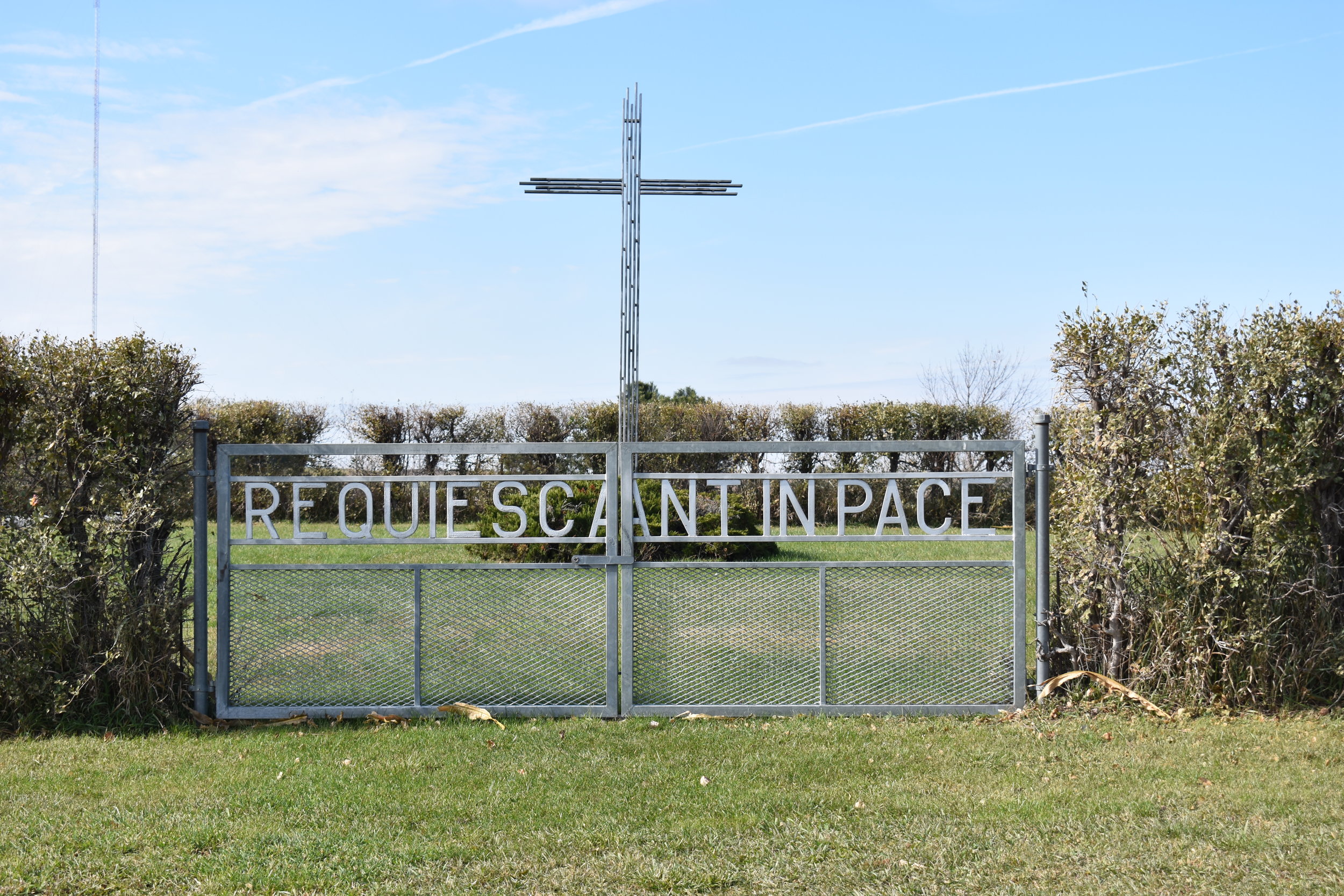
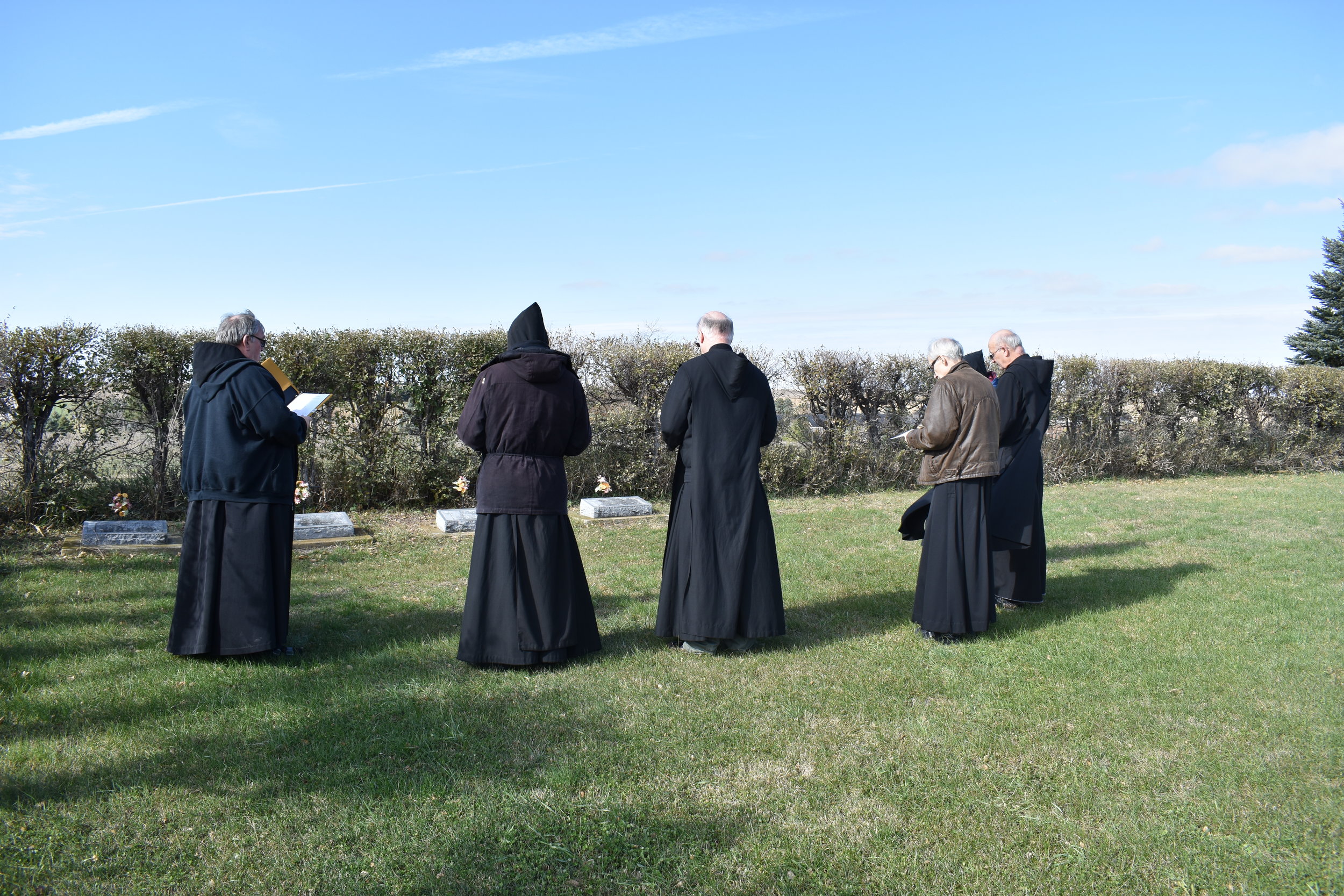

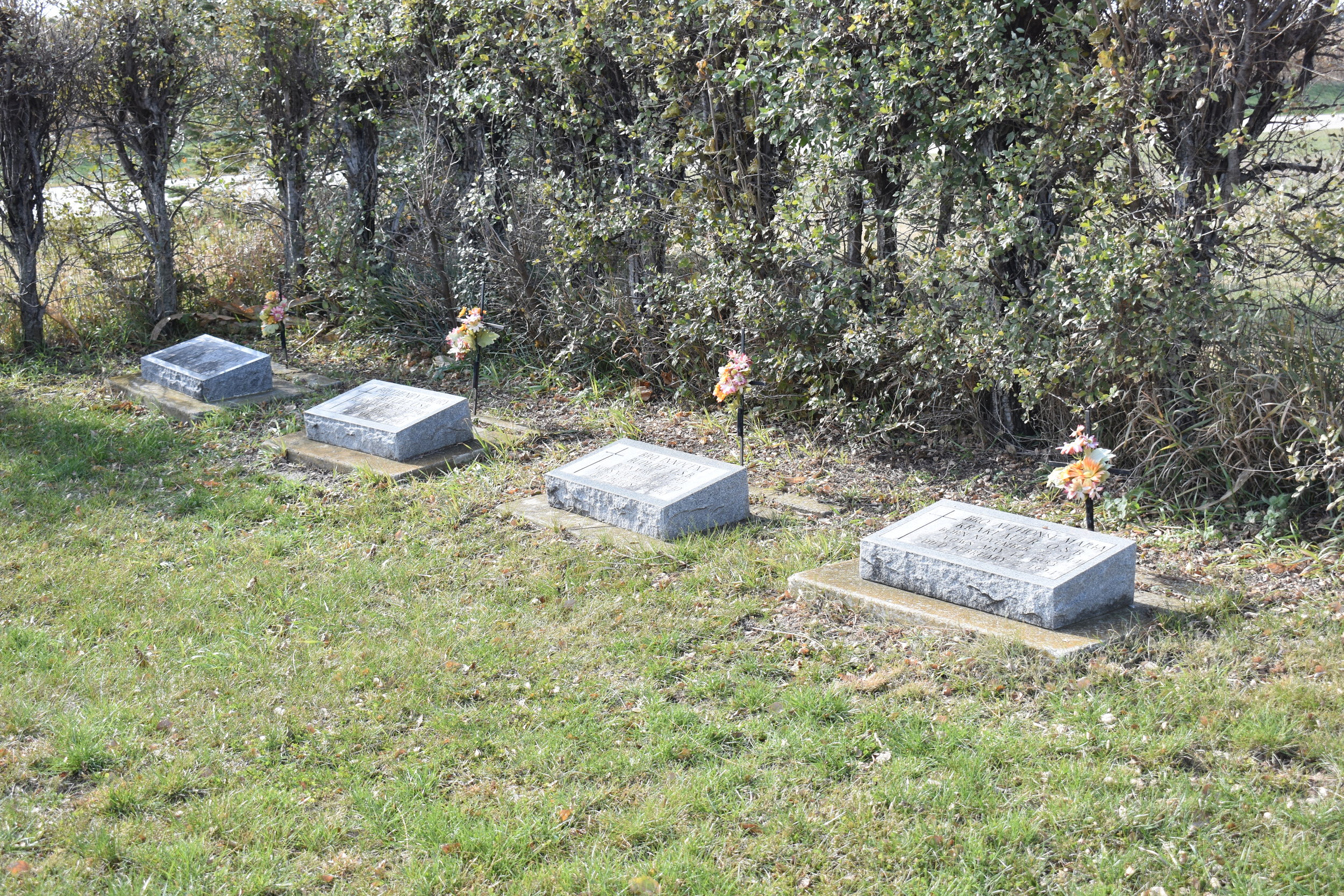
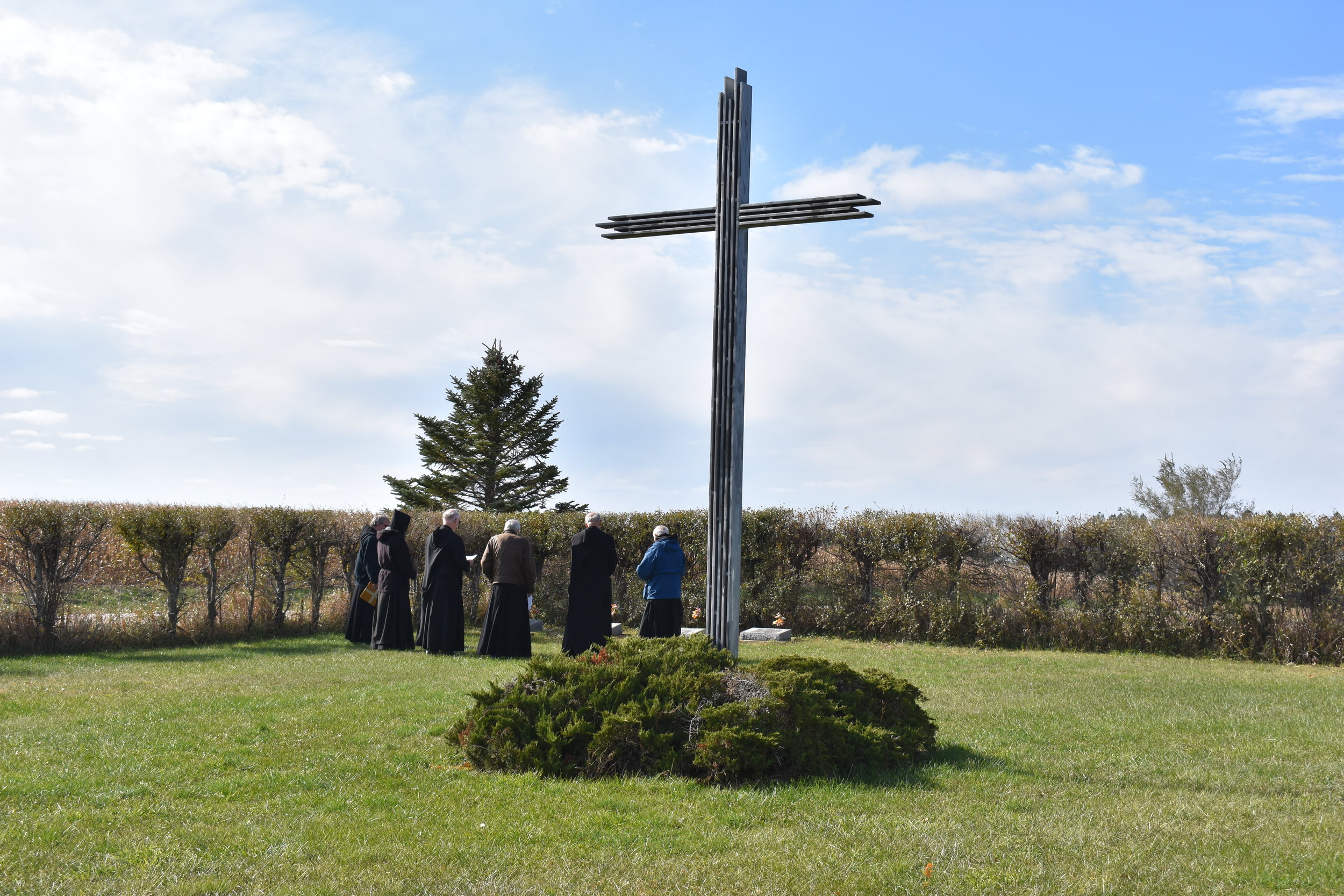
Memorial Celebration for Brother John Vianney
Memorial Mass for Br. Vianney Rentmeister OSB
October 26, 2017
Isaiah 25:6–10a
Romans 8:31b–35, 37–39
Luke 24:13-16, 28–35
When people speak to me of Br. Vianney, they mention two things: he was the monastery cook for some 20 years and he was a brother on the road, making contacts that lasted for years. This boils down to food and making contact with people, creating links for the missions and for friendship.
It seems appropriate that when we gather to remember the dead, we hear words from Scripture about food. Food and drink, good food and drink, is one of the images bequeathed to us about our future. There is a direct link between the food and table we sit at here and the table that is in our future. How can what is of necessity (no food, no drink, we die) in this life actually be a hint of and a share in the life to come? Doesn’t this life pass away? How is it that the tables of this life already point to another table? We eat the food and it is gone! Can it last?
But we know that eating and drinking is more than filling the stomach. At the heart of eating and drinking is communion; eating and drinking together creates a bond among those at the table. The food taken in common does more than quiet growling stomachs. The food and drink are shared and in that sharing the lives of those who eat and drink are shared. The joys and sorrows, happiness and pain of those at table are also shared. From the experience of being alone or isolated, we come to know that we are also with others. To prepare the food that others will share and so enter into communion with one another is an honor as well as a task. One is preparing others for communion. One is pouring one’s own life into the food; one’s labor, time and imagination are all found in the food we find on the table. To share in food placed in front of us is already sharing in a work of service and love. Communion with one another in love through food—is that not a touch of the future, of life eternal?
Isaiah thought so. For him God was the one preparing the food. Rich food and choice wines, he sees. He sees the best, because he sees that when God prepares the food, the life and communion hidden in sharing the food do not end. The death, the separation that comes when we leave the tables of this earth is healed. The hint of eternity in our daily common meal is now real, it is completed. Br. Vianney’s meals, whether we found them tasty or not, were in reality pointing us as a community toward the fullness of communion in what we call the heavenly table or banquet. Of the many human, even ordinary, experiences we have, the common meal of sharing food and drink together is one of best images we have of the new life of resurrection. In that new life, any veils over or shadows on our table companions here are gone. Anything preventing a full communion with one another here is lifted and we are face to face with one another in all our beauty, tenderness and love. Whether we knew it or not, these were hidden in the food we shared day in and day out. Now they come into full communion.
Our gospel story this evening is likewise a food story, a bread story. The two disciples on the road to Emmaus are surrounded by death, disappointment and hopes dashed. They are separated from one whom they came to love and one who loved them. They are at a low point. A stranger walks along with them. Evidently, the word he speaks causes their hearts to wake up, to become warm again. As he communes with them in word, they are consoled. Even more, their lives begin to have meaning again. They said their hearts were burning…..they were coming alive, throbbing with new understanding about what happened to this Jesus on whom they set their hopes. In their excitement, they offer hospitality to the one awakening meaning and hope in their lives. They share bread. Then suddenly in the sharing of bread, it all comes together. Communion happens in a flash. It is in the bread broken; communion happens when bread is broken and shared. But they came to realize that it is precisely Jesus, whom they know, that can both be broken and bring together. They only saw bread broken, death and separation. They thought it was the end. Then they saw and heard a stranger. Then the stranger’s gesture triggered memory; they remembered that pouring out a life, breaking a body was an act of love. It was a gesture for others; hidden in the food was a whole life lived for others. When Jesus does that, then he is alive. The words and the breaking of bread is the sign of resurrection. The simple food contains love and life. These never end.Br. Vianney went on many trips, drove down many roads and was welcomed by many people. He listened to many words, heard many stories. He was offered food and drink. In it all was he not creating communion and solidarity in faith among those who welcomed him? In the communion he maintained with many over the years, I would guess he encouraged many to see beyond their disappointments, sorrows, pain and loss. He no doubt invited them to look deeper and farther to see a living God who will not allow anything to stand in the way of his loving. For our God does not see separation in all its faces, but sees only a communion of all who said yes to his love. Yes, our God sees them and is already preparing that table of rich food and fine drink from which we will never have to rise again.
Joel Macul, OSB
Mission Sunday, 2017
Celebration of the 50th anniversary of profession of Prior Joel Macul, OSB
and 25th anniversary of ordination of Fr. Thomas Leitner, OSB
Zechariah 8:20–23; Romans 10:9–18; Mt 28:16–20
Many years ago when I was living at St. Benedict’s Monastery in Nairobi, the monk living next to me was from Uganda. We got along rather well and one day he said rather insistently, “Being a missionary means leaving your village.” By this time, I was well aware of what leaving one’s village could mean for an African. “Village” did not just mean the place where you grew up. To be a missionary meant you had to leave the whole mindset of the village, the close relationships, yes, but also the village mentality, that these few houses and these people constituted the real world. To leave the village, meant leaving behind that community as the sole referent point in your life, the only way of thinking, and being willing to find life and the meaning of life in someone else’s village, community, world, way of thinking. Brother knew that to leave one’s village meant a death to all you may have found precious. But that was the beginning of being a missionary. Admitting that the world view and the relationships you liked had to be set aside and you had to move on and out into what might very well be a totally different world. If you didn’t leave your village, if you did not want to leave your village, you could not be a missionary.
To leave home, to be sent away from home and love it is part of the picture of being a missionary. On this Mission Sunday, the Word we have heard offers us at least three other images of what mission and missionary mean. In those days, the Lord says to Zechariah, people of every nationality will take hold of every Jew by the sleeve and say “Let us go with you for we have heard that God is with you.” … Someone comes up to you grabs you by the sleeve of your jacket and says I’m coming with you. I see God in your face and hear him in your words….But the someone who comes up to you, is not from your village. No, he can barely speak your language; his skin may be that of an Hispanic, Afro-American, Asian, Native American; she is different, she may come from across the border. But he has watched you, he has felt your faith and heard how you have spoken gently and encouragingly to others; he or she has heard you say that Jesus has been the road you follow. he has been your Way. And Jesus’ way has meant seeing the divine and the holy in each person. This stranger has seen how you have gone out of your way to look after someone else, been patient with another’s hurt. In a word, this stranger tugging at your sleeve has found your way of life attractive. Something about the way you talk, the way you are with people has moved this person pulling at you. You and your way, the way of Jesus that you live, has become visible to someone and they want you to bring them into that same relationship with Jesus. This person has experienced God through you.
If the vision of Zechariah is clear, it means that God’s community, God’s family is not just from my village, or my country. The vision of God for us humans is a humanity that multi-cultural, multi-lingual on a journey toward the one Father of all and in whom we become one. But for this vision of God to happen, I must be ready to acknowledge someone pulling at my sleeve and saying, lead me to the God who has loved you and walks with you. ….Has it ever happened to you that someone has taken hold of your sleeve and said show me the hope that you carry, the source of your generosity? If that has happened and you have brought that person along, then you are part of God’s mission and you are a missionary. Or have you ever pulled at someone else’s sleeve and said to another, your faith, your love, your words have moved me and confirmed in me the mercy of God? Have you let someone else lead you into the mystery of God and his Son? Yes, pulling at someone’s sleeve because you find their heart attractive, that is part of mission.
Now let us pick up an image from Paul. Let us go down from the sleeve to the feet. Paul quotes a line from Isaiah: How beautiful are the feet of those who bring the good news! But before we come to the beautiful feet we have to pass through the heart. It is the heart that will give direction to the feet. The feet will go where the heart will tell them. Our lives will walk along a path that the heart speaks to them. But the heart can only give directions to the feet, to the direction of our lives, if the heart has heard a good word. The heart must hear about the word of Christ. Someone needs to open their mouth and speak about the treasure that is Christ. The heart must speak what it believes, what it knows to be true. The heart must speak the story of Jesus and God’s faithfulness is bringing him from death to life. When someone speaks that story of God’s fidelity into our heart and then we move with our feet in that same direction of fidelity and love, then our feet become beautiful. The feet are carrying the message of a heart that knows what is good and true for it. When I carry the message of truth and goodness in my heart and my feet are guided by the word of Christ, I shall surely be cutting a path that leads to peace. The Good News being carried by my feet is one of healing for humanity. It is a message that comes from the Lord of all. If I call his name and listen to his response, then my heart is shaped again in his image and my feet, my life will find its fulfillment in a peace that makes no distinction of persons, as Paul insists. That too is a being a missionary: someone who speaks words of peace, someone who can walk in God’s wholeness, his shalom, even in a broken world, strident world.
An image from Jesus. He is about to send out these messengers with beautiful feet. Notice the command: to make disciples of all nations. God’s vision is universal. I have to be able to see the horizon God sees, not necessarily my own. Making disciples happens in a baptism in the name of Father, Son and Spirit. Mission is inviting others into a Trinitarian relationship. Disciples are about naming, naming the people who make up humanity. But that name is three fold. It is not the name that villagers would give. It is naming others by the name of the living God. In the naming of others, the missionary is claiming them as members of a God who is community. We treasure our names, we are careful about our names. They are our identity. But now our identity is found in the name of Father, Son and Spirit. We are baptized into the communion of the Triune God, a communion that is marked by faithful love, a love into which we are definitively drawn by the Son and a love that is constantly nurtured by the Spirit. Invoking God’s name over others so that when they rise out of the waters, they rise into a new community of the divine and human: building up that community is being part of God’s mission.
On this mission Sunday we are also gathered to give thanks to God for the lives of two of us who have in the mysterious course of our lives left our villages, wonderful villages. We left them and went to other nations and tongues. Whether we went with beautiful feet, I cannot judge. But I can say that we went with a hope that the love of the Father for all people would become real for others. We went with the hope that when we left and moved on, as we must, we might hear the simple words: “You taught us another way to live and be. Thank you!” Surely if that happened, then in some small way the tug on our sleeve changed us as much as it changed the ones pulling on that sleeve. For we were both the ones sent and the ones who received. And so, as St. Benedict says, Our hearts expanded. And to give all of us new, expanded hearts is what our God’s mission is all about.
Prior Joel Macul, OSB
Obituary - Brother Vianney (Richard) Rentmeister, OSB
On Tuesday morning, 3 October 2017, our dear
Brother Vianney (Richard) Rentmeister, OSB
died in a hospital in Berlin.
On 20 September we found out that he had suffered a heart attack while on vacation. Several times first responders tried to resuscitate him, he was placed in intensive care, all the while Abbot Michael showing constant concern.
Br. Vianney was always considered very healthy, so all the more shocking and painful for us is his sudden death.
Br. Vianney was born in Wertheim on 26 October 1941. He grew up with six brothers in a faith-filled family. His father Ewald and his mother Barbara gave shape to a classic railroad family. It was always very important to him and a valuable inheritance. Perhaps from there Richard learned from a young age what was testified of him at the time he was in the candidates’ school: very diligent, his behavior in the community is very good, adapts very well to the order of the house. After primary school in Wertheim, he trained as a tailor in the monastery tailor shop.
Br. Vianney entered the abbey on 10 August 1958. He was admitted to the postulancy on 10 September 1958 and the novitiate on 10 September 1959, making his first profession on 13 September 1960. His solemn profession took place on 30 April 1967. Until he began his main occupation in 1963, he served for two years in the infirmary and another two years in assisting in the construction of the greenhouses. But then the fifteen years in the Münsterschwarzach procure helped to form his exemplary attitude of reverence, gratitude and openness in relating to everyone. In 1978 Br. Vianney was transferred to our St. Benedict Study House in Würzburg for five years. Again there was a small procure to be looked after. He left behind prominent traces in his work with altar servers, contacts that have lasted up to the present day. On 17 July 1983, Br. Vianney arrived at our priory in Schuyler, Nebraska, where he was to spend the next twenty-seven years of his life.
He was trained by Brothers Norbert Hasenmüller and Henry Libory Hartlief in the ways of a traveling brother, which he then diligently followed from 1985 to 1990. His journeys took him to New Mexico, Wisconsin, Mississippi, Georgia, North Carolina, California and Texas. We hardly know how many people Br. Vianney made contact with. That he was faithful to his contacts, we know for certain. They are the people who carry on the support of the work of the Benedictine Missionaries up to today.
After the death of Br. Innocent Rudloff in 1990, Br. Vianney went to work in the kitchen of the Schuyler community. A year’s training qualified him for this. To be the mother and soul of a house likewise suited his character. Those who experienced this can speak of it. Even so, during his time as priory cook, he would still go on the road to visit and make contact with donors. On 9 August 2010, shortly after the priory celebrated its 75th anniversary, Br. Vianney returned to Münsterschwarzach. His account of the past years ends: “I am grateful for these years in the USA, for my confreres, but also for the many thousands of people whom I had the chance to meet.”
From September 2010, we find him on the team at our reception area in the abbey. This task also included the readiness to answer calls at night and a diverse telephone ministry. Br. Vianney was prepared for this service by his time as assistant novice master from 1972 to 1978 and especially by his experience in making contact with a wide variety of people while traveling on behalf of the missions throughout the United States.
With him, we lose a confrere who fulfilled his tasks quietly and reliably, who had an active spiritual life, and who was deeply connected with the community. He was a faithful companion for countless people with whom he was in contact for many years. The community of Missionary Benedictines loses in Br. Vianney a “Missionary on the home front.” We thank God for his fruitful life.
The Eucharist was celebrated for him on Saturday, 7 October 2107, at 10:30 a.m., in the Münsterschwarzach Abbey Church and afterwards he was laid to rest in the monastery cemetery.
Münsterschwarzach, 7 October 2017 Abbot Michael and the monks of Münsterschwarzach
Prior Joel and the monks of Christ the King Priory
A public memorial Mass will be celebrated for Brother Vianney at Christ the King Priory, Schuyler, on Thursday, October 26, 2017, at 5: 30 p.m. RIP.
Homily - 27th Sunday of Ordinary Time
Is 5:1-7, Philippians 4>6-9; Matthew 21:33-43
Jesus commands our attention saying, “hear another parable.” He spins the tale of a landowner with rebellious tenants. The more the owner seeks his due, the more vicious the tenants’ response.
When Jesus challenged the religious leaders to write the end of the story , they condemned the tenants even though they realized that they were the ones implicated. Jesus softened their sentence by telling them, “The Kingdom of God will be taken away from them and given to people that will produce fruit. “
The situation was embarrassing for the leaders; the angrier they got, the more they were admitting that they understood that the evil tenants represented them and Jesus was the son. So they immediately started plotting against Jesus.
Jesus’ reason for speaking the Parable in the final weeks of his ministry is clear. Throughout his public life, Jesus, Son of God, had claimed the right to exercise His Father’s authority over His people. Instead of respecting this claim, the Scribes and Pharisees saw it as a threat to their own dominion over God’s people. They adopted a “He’s got to go “attitudeand Jesus knew they would soon make their move to dispose of Him. It was in this context, that Jesus spoke the Parable of the Tenants. In effect, He is saying to the Scribes and Pharisees,” you may think that getting rid of Me will resolve the matter in your favor. But remember, that is precisely what those wicked tenants imagined. Killing me will not result in My defeat but in your own ruin. You will never be able to successfully resist my Father’s claim to absolute dominion over His people- even if you should kill His Son! Even death has no claim over God’s people. He will never abandon them.
This parable has a history of tragic misinterpretation. It has been used as a pretext for condemning Jewish people while raising up the supposed pure race. A few days ago I stood at the Jewish Ghetto Monument in Warsaw and was overwhelmed thinking about the inhuman atrocities of the Nazis on the Polish and Jewish people. The anti-Semitism over the centuries is another example of the tragic misinterpretations. To deal with that sort of distortion of the Gospel, we should follow this rule of thumb; If one of Jesus’ parables does not call us to conversion, we haven’t understood it. Jesus used parable to shock people into conversion. Parables aren’t puzzles to be understood, but calls to action crafted to make us uncomfortable enough the change our ways.
When we read today’s parable in the light of our world situation and in the light of Pope Francis“Laudato Si “ Encyclical we find ourselves in the sandals of the tenants. Pope Francis reminds us that God has entrusted this Earth to us. Francis could have been writing a commentary on this parable when he said that our role in the world must be understood as one of stewardship. Francis quotes St. John Paul II saying: “Once the human being declares independence, and behaves with absolute dominion, the very foundation of our life begins to crumble. For instead of carrying out our role as cooperators with God in the work of creation, we set ourselves up in place of God and thus ends up provoking a rebellion on the part of nature.
When we read Jesus’ parable of the wicked tenant as a commentary on human responsibility for our Earth and all its peoples, we find ourselves feeling less righteous and much more challenged. None of us can read Francis’ encyclical and feel vindicated. Whether as steward of the Earth or spokesperson for the world and her most vulnerable creatures, we are called to continue to produce the fruits the Creator hopes to see from us.
Francis tells us: “As Christians we are also called to accept the world as a sacrament of communion, as a way of sharing with God and neighbors on a global scale. It is our humble conviction that the divine and the human meet in the slightest detail in the seamless garment of God’s creation, in the last speck of dust of our planet.
Being stewards of creation requires that we approach our Earth as a source of communionor hear the judgment : “it will be taken away from you and given to a people that will produce its fruit.”
Fr. Volker Futter, OSB








